Consumers’ Growing Use of Portals and Apps: People Embracing Their Patient Journeys
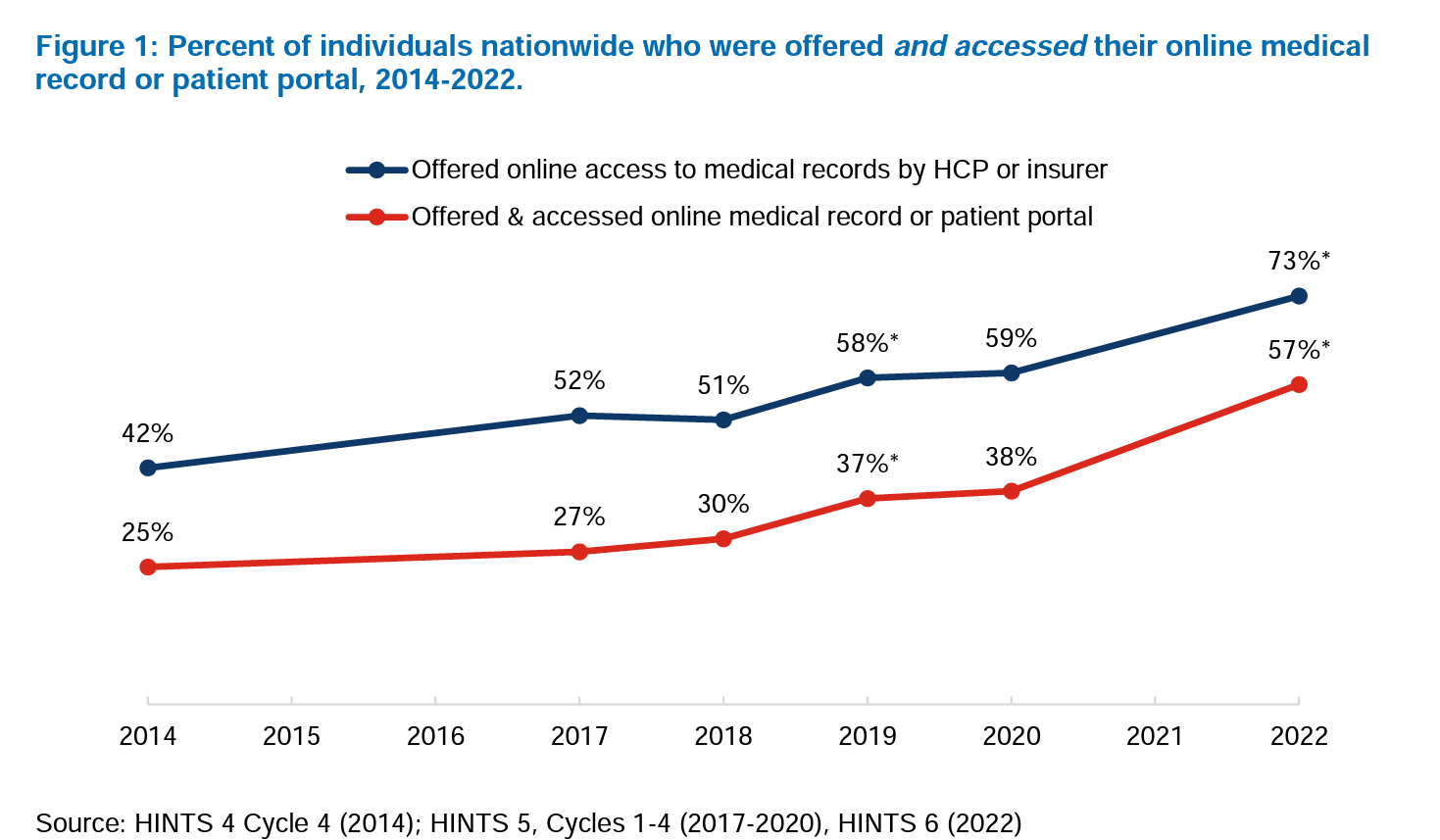
The latest read from ONC, the Office of the National Coordinator for Health IT, tells a story about patients’ growing use of online portals, medical records, and smartphone apps to access personal health information. We now have solid evidence empowering us to disagree with Col, Nathan Jessup, the iconic character played by Jack Nicholson in A Few Good Men, who responded to Tom Cruise’s Lt. Kaffee’s demand for “the truth” as the villainous Colonel raged, “You can’t handle the truth.” But ONC data belies that: as it happens, patients can handle the truth, as we learn that 9 in 10
“Your care, your way:” Learning from the Philips Future Health Index 2023
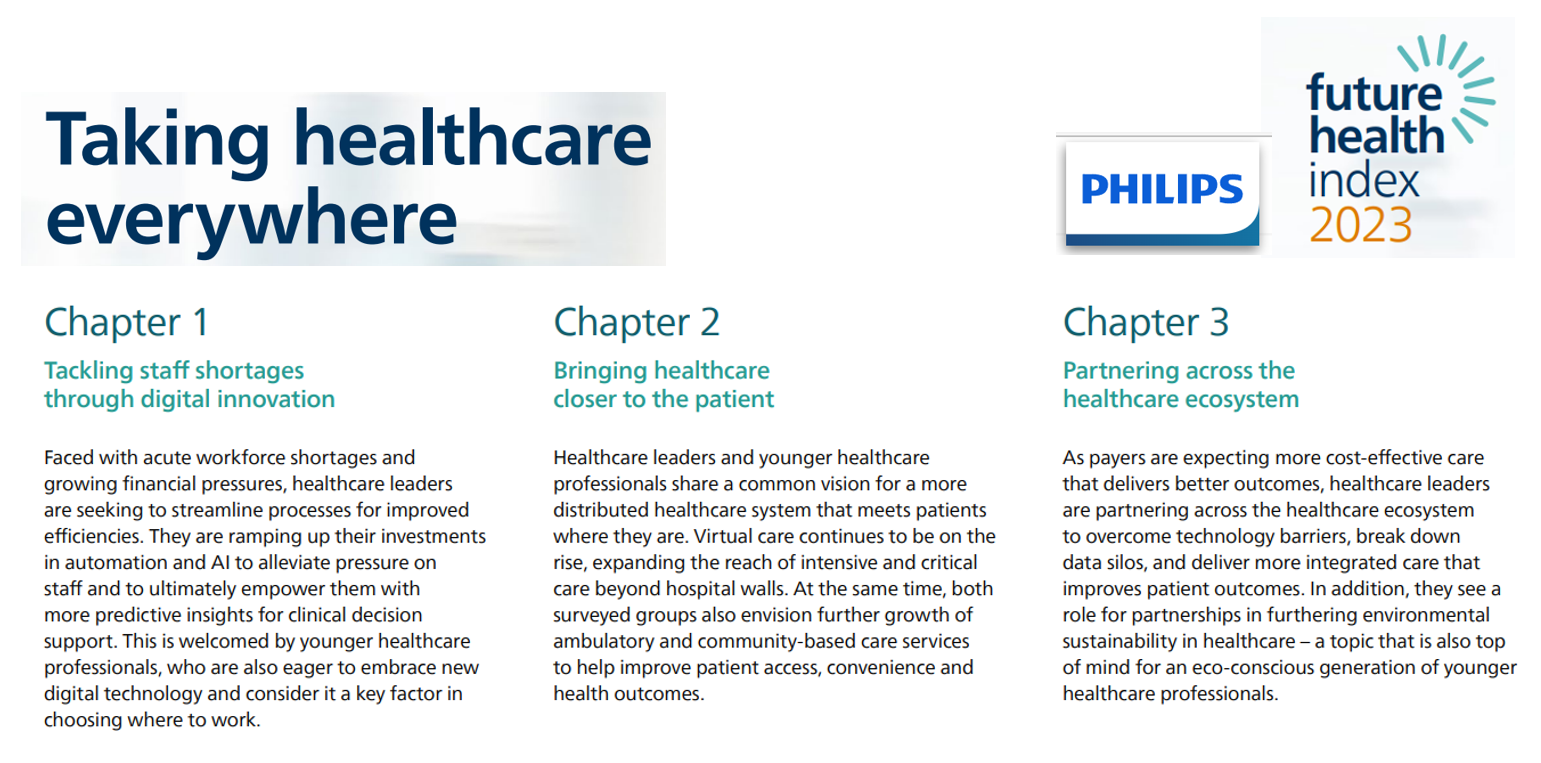
Consider the key drivers of supply and demand in health care, globally, right now: On the medical delivery supply side, the shortage of staff is a limiting factor to continuing to deliver care based on the usual work-flows and payment models. On the demand side, patients are taking on more demanding roles as consumers with high expectations for service, convenience, and safe care delivered closer to home — or at home. This dynamic informs The Future Health Index 2023 report from Philips, launched this week at HIMSS 2023. This is the eighth annual global FHI report, with detailed country-specific analyses to
Techquity: Getting Healthy Through Equity-by-Design
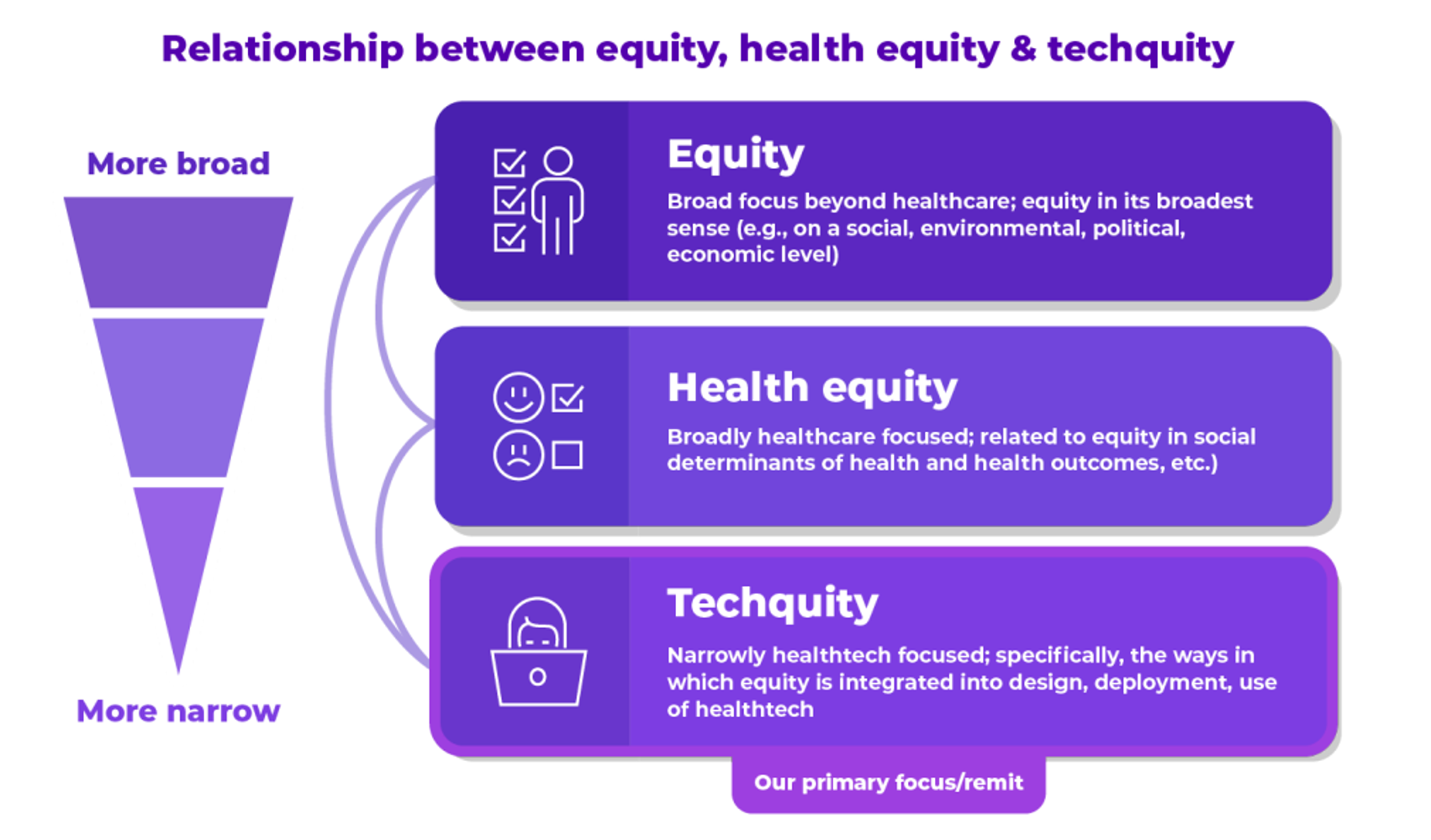
The U.S. spends more on health care than any other nation in the world. Yet Americans’ health outcomes rank relatively low compared with other wealthy peer nations on Planet Earth, manifesting a low return-on-investment for this huge financial spend. Nowhere is this more evident than in America’s place in equity compared with nine countries, shown in the graph on health care system performance from The Commonwealth Fund’s perennial study, Mirror, Mirror – the latest version of which was subtitled, “reflecting poorly” on health care in the U.S. Equity is an over-arching concept that the
Patients Have AI-Disconnect When it Comes to Their Health Care – Pew Research Center Insights
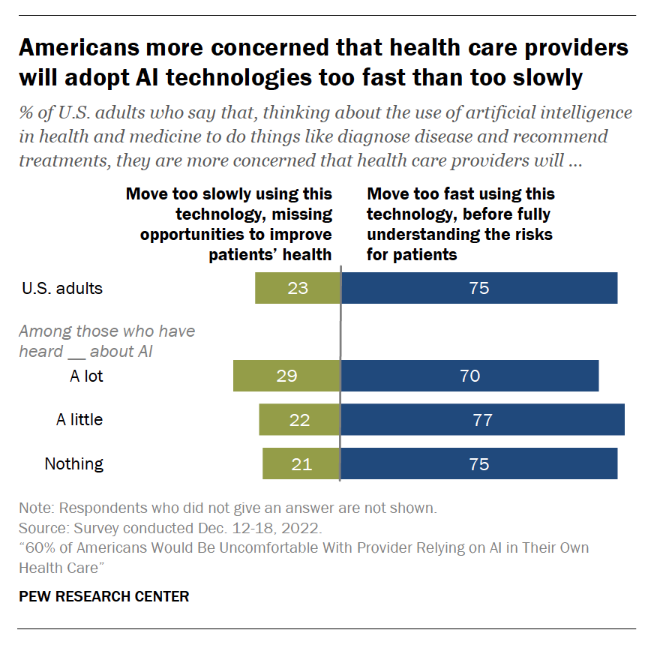
Most U.S. health citizens think AI is being adopted in American health care too quickly, feeling “significant discomfort…with the idea of AI being used in their own health care,” according to consumer studies from the Pew Research Center. The top-line is that 60% of Americans would be uncomfortable with [their health] provider relying on AI in their own care, found in a consumer poll fielded in December 2022 among over11,000 U.S. adults. Most consumers who are aware of common uses of AI know about wearable fitness trackers that can analyze exercise and sleep
What Person-Centered Interoperability Looks Like: Seqster
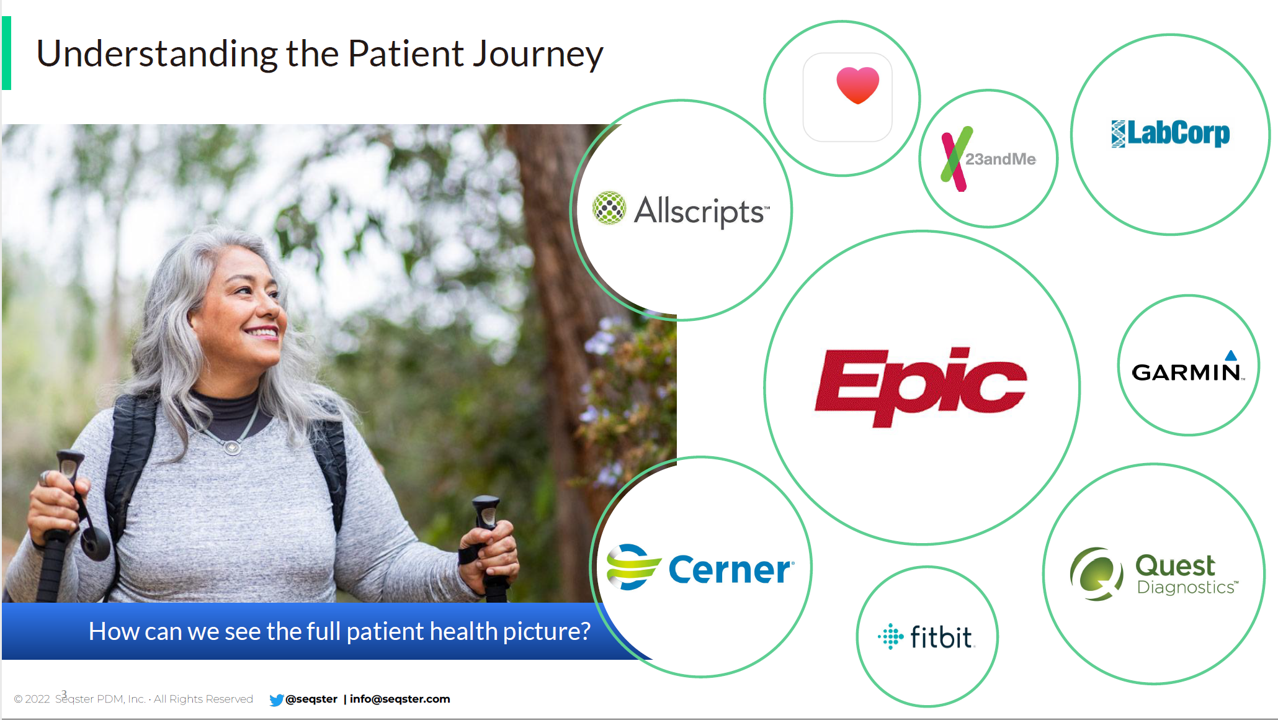
He had me at the statement, “I believe health data is medicine.” Those were the words of Ardy Arianpour, CEO and Co-Founder of Seqster, when sharing with me how his company was founded. We met up last week at the DIA Europe 2022 meeting (Drug Information Association) in the cool SQUARE Conference Center in Brussels, Belgium (my current home base for work and life). It was a rare opportunity to sit still with this on-the-go guy with whom an hour spent is the equivalent of three hours with most other folks. Ardy and the team call Seqster “the operating system
Techquity: How Technology Can Help to Scale Health and Digital Equity, Live from VIVE 2022
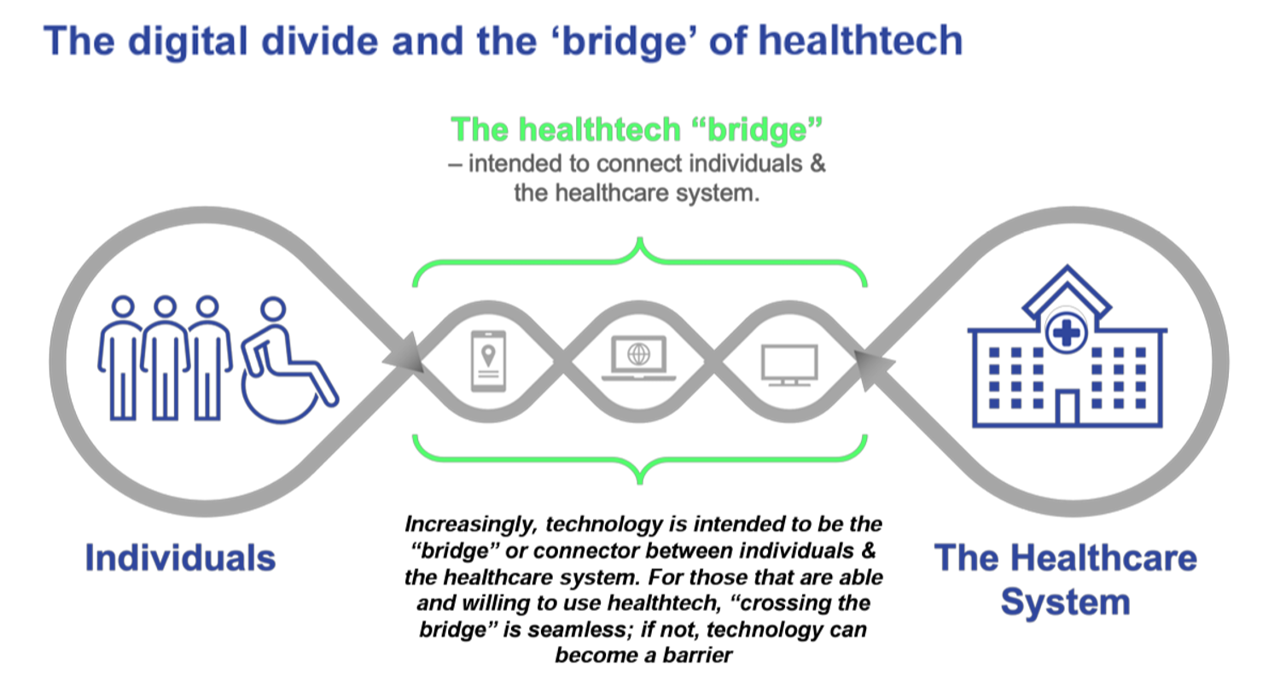
The COVID-19 pandemic revealed long-systemic health disparities in the U.S. and in other parts of the world. Income inequality, sickly environments in homes and communities (think unclean air and water), lack of public transportation and nutritious food deserts combine to limit peoples’ health and well-being., Beyond the traditional social determinants of health, such as these, we’ve called out another health risk that became crucial for life in the coronavirus pandemic era: digital connectivity, Indeed, WiFi and broadband represent the newest social determinant of health to add to a growing list of risk factors that challenge health citizens’ health. Kudos to
“Complexity is Profitable” in U.S. Healthcare – How to Save a Quarter-Trillion Dollars
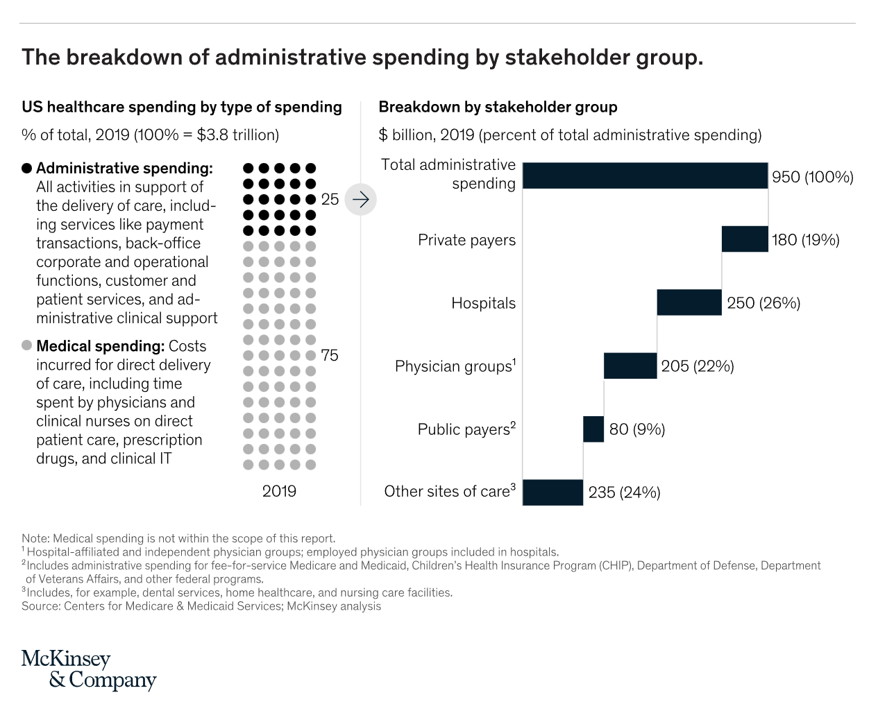
In the U.S., “Health care is complicated because complexity is profitable.” So explain Bob Kocher, MD, and Anuraag Chigurupati, in a viewpoint on Economic Incentives for Administrative Simplification, published this week in JAMA. Dr. Kocher, a physician who is a venture capitalist, and Chigurupati, head of member experience at Devoted Health, explain the misaligned incentives that impede progress in reducing administrative spending. This essay joins two others in the October 20, 2021 issue of JAMA which highlight administrative spending in American health care: Administrative Simplification and the Potential for Saving a Quarter-Trillion Dollars in Health Care by Nikhil Sahni, Brandon
Be Mindful About What Makes Health at HLTH
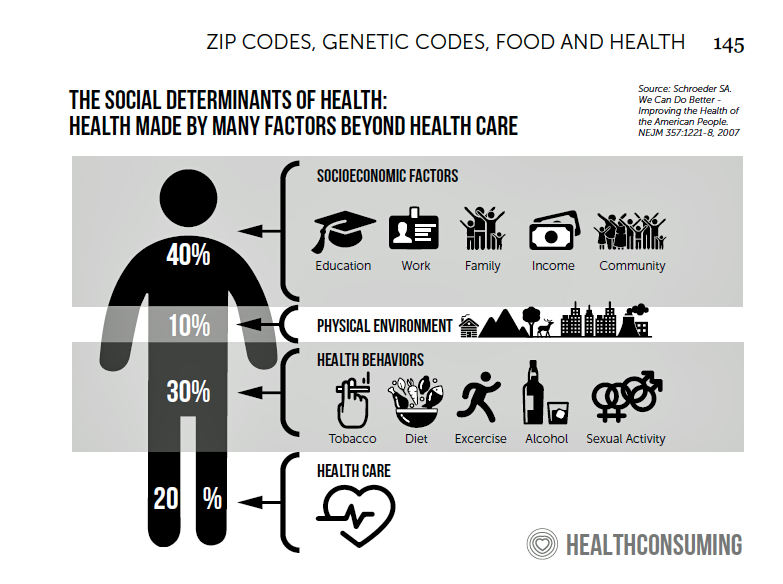
“More than a year and a half into the COVID-19 outbreak, the recent spread of the highly transmissible delta variant in the United States has extended severe financial and health problems in the lives of many households across the country — disproportionately impacting people of color and people with low income,” reports Household Experiences in America During the Delta Variant Outbreak, a new analysis from the Robert Wood Johnson Foundation, NPR, and the Harvard Chan School of Public Health. As the HLTH conference convenes over 6,000 digital health innovators live, in person, in Boston in the wake of the delta
Can the U.S. Improve Health System Performance with Digital Health Tools? Pondering A Big Question for #HIMSS21
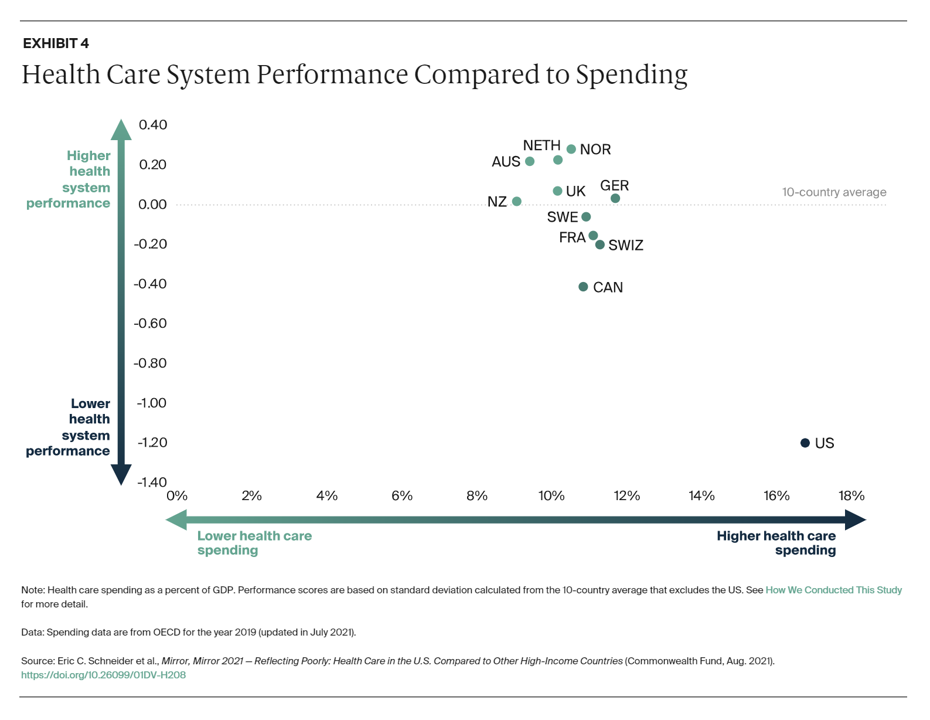
Simply put, is the equation, “Spend more, get less” a sustainable business model? Of course not. But that’s the simple math on U.S. health care spending and what comes from it, according to Mirror, Mirror 2021: Reflecting Poorly, a perennial report from The Commonwealth Fund that compares health system performance across eleven developed countries. The first table details the metrics that the Fund compares across the eleven peer nations, which included Australia, Canada, France, Germany, the Netherlands, New Zealand, Norway, Sweden, Switzerland, the United Kingdom, and the United States. The metrics compared were access to care, care process, administrative efficiency, equity,
Regulation, Reimbursement, and Interoperability Block Health Systems’ Digital Transformation – The State of Healthcare in 2021 From HIMSS
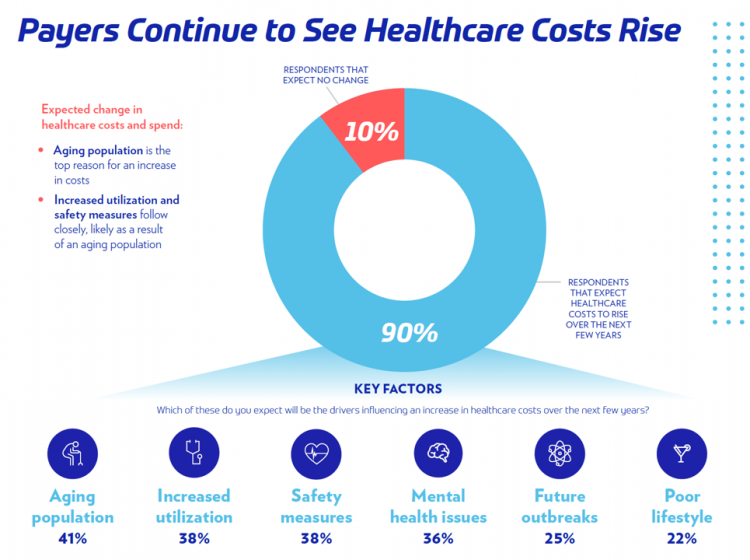
There is no doubt that the COVID-19 pandemic motivated health care providers, payers, and patients to adopt digital tools and contact-less services, allowing people to deliver and receive medical care. Still, 18 months into the pandemic, now endemic and in its fourth wave of cases spiking around the world and in many parts of the U.S., some aspects of “digital transformation” seem not to have fully transformed American healthcare, we learn in HIMSS’s annual 2021 State of Healthcare Report. HIMSS collaborated with the organizations Trust Accenture, The Chartix Group, and ZS on this year’s research. Nine in ten clinicians have recommended
COVID-19 Accelerated Digital Health Investments…But It Helps to Be Bigger, Mature and Scaling
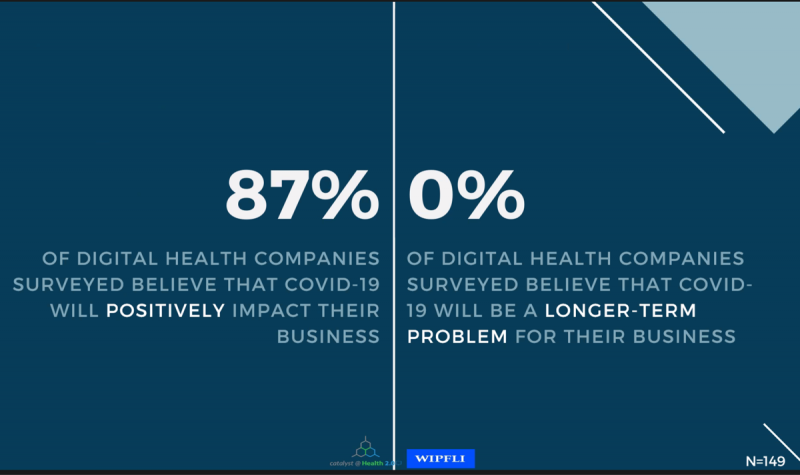
“Compare digital health to airlines, cruise lines, and other industries” and the sector looks quite privileged, opined Matthew Holt in a discussion on a study diving deeply into the State of Digital Health, conducted by Catalyst @ Health 2.0 and sponsored by WIPFLI.. The research was conducted among 335 respondents, which included 182 digital health companies polled between November 2020 and March 2021. Digital health companies represented 60% of the sample, the other 40% of which were consulting firms, subsidiaries of providers/payers/life science companies and tech corporations, and investors. As Matthew called out, the digital health sector has a relatively
Trust-Busted: The Decline of Trust in Technology and What It Means for Health
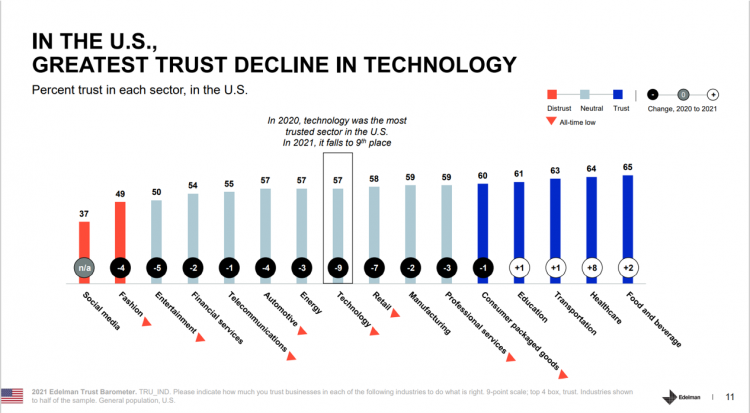
Trust in the technology industry has crashed to an all-time low based on the 2021 Edelman Trust Barometer. As Richard Edelman, CEO, concisely asserted, “Tech loses its halo.” The first chart shows the one-year trend on trust across industries through U.S. consumers’ eyes. Most industries lost citizens’ trust between 2020 and 2021, most notably, Technology, dropping the greatest margin at 9 points Retail, falling 7 points, Entertainment. falling 5 points, and, Fashion and automotive declining by 4 points. Several sectors’ trust equity rose in the year, especially healthcare growing by 8 points and food and beverage rose slightly by 2
Managing the Risks of Fast-Growing Digital Health
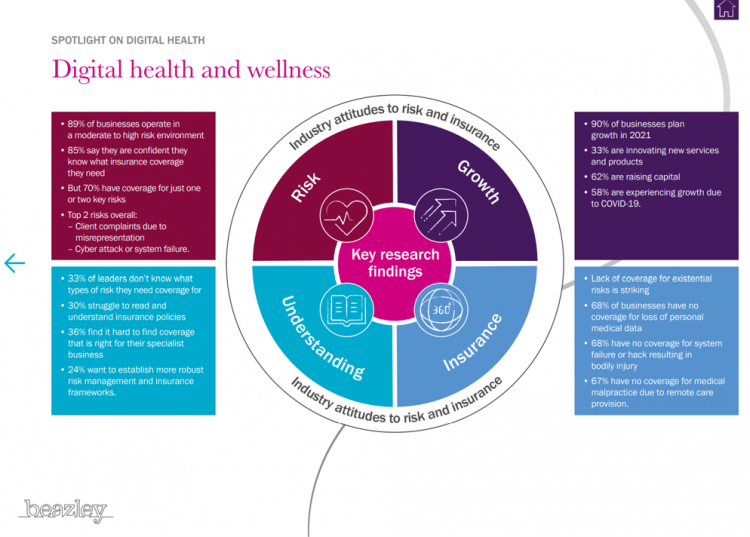
Investments in the digital health sector have fast-grown in the past decade, reaching $14bn in 2020 based on Rock Health’s latest read on the market. The COVID-19 pandemic accelerated the field across many industry segments. With such turbocharged growth on the supply side, Beazley, experts in specialty insurance, explores the risks of digital health and wellness in a new report, Digital health, telehealth and wellness: Attitudes to risk and insurance. With great potential for both innovation and reward comes great risks: Beazley points to the facts that, over two-thirds of digital health companies lack insurance coverage for medical malpractice for
Ten Forces Shaping Health Care in 2021: A View from CVS Health
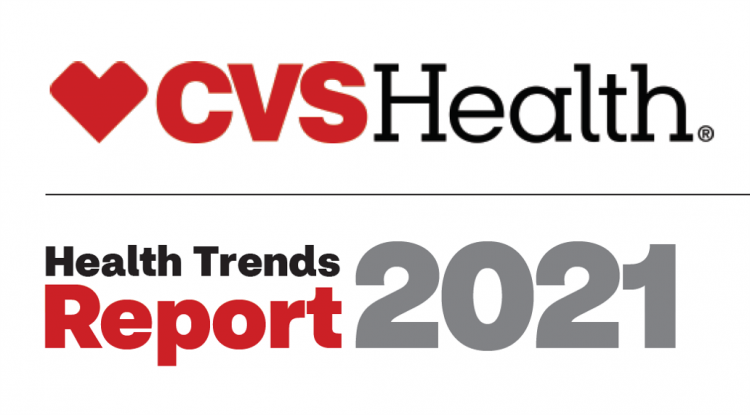
Expanding omni-channel, data-driven, cost-effective health care in the community, tailoring that care, and attending to mental health paint the picture of health through the lens of CVS Health. The company published the Health Trends Report 2021 today, calling out ten forces shaping health care this year. Those themes are, The Year of the Pharmacist The Next Step Forward in Cardiac Care Cancer Needs a Better Roadmap The EHR Hits Its Stride The Mental Health Shadow of COVID-19 Tailor Care to the Older Patient More Agents that Predict Disease Paying for the New Medical Miracle Virtual Care Goes Mainstream, and Diabetes
A New Health Literacy Pillar: Personal Data Stewardship
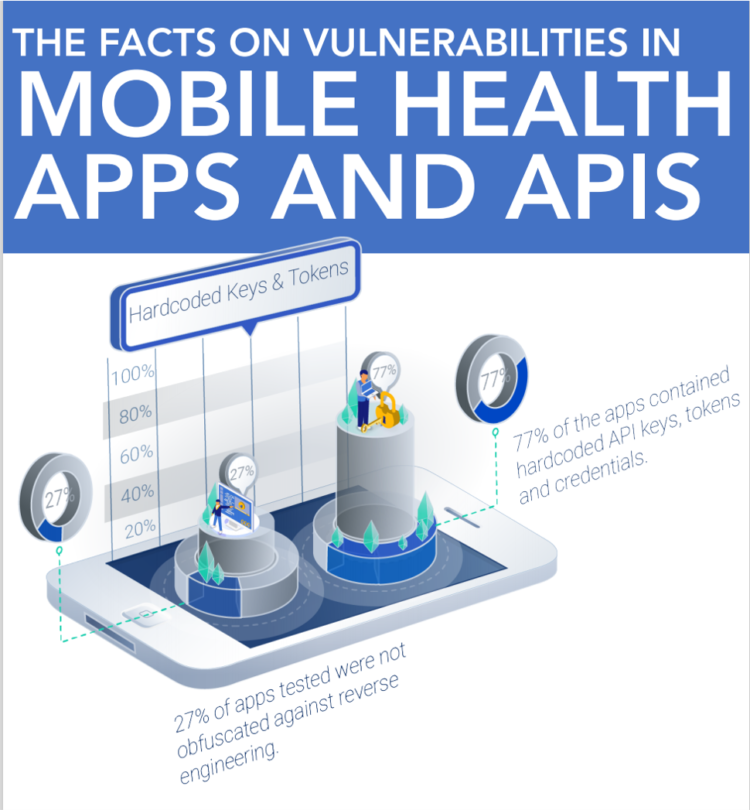
The growing use of APIs in health information technology innovation for patient care has been a boon to speeding development placed in the hands of providers and patients. Using APIs can help drive interoperability and make data “liquid” and useable. APIs can enable “Data liberación,” a concept proposed by Todd Park when he worked in the Obama administration. Without securing patients’ personal health data leveraging APIs, those intimate details are highly hackable explained in All That we Let In, a report from Knight Ink and Appr0ov. It is likely that behind growing health data hacks is the marginally greater financial
The Digital Transformation of Home for Health – Brainstorming with Karsten Russell-Wood of Philips
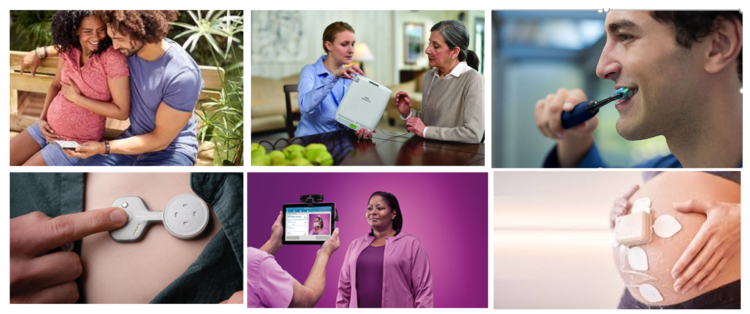
At the start of CES 2021, I had the opportunity to catch up with Karsten Russell-Wood, Portfolio Marketing Leader, Post Acute & Home, Connected Care at Philips. We brainstormed just as CES 2021 was going to “open,” virtually, for the consumer electronics conference’s first all-virtual meeting. Philips, a longtime major exhibitor at CES, created an entirely new online experience for the CES attendees – a sort of virtual gallery of different exhibits that are accessed from a single point in a “room” with various entry points. One of the company’s key messages for CES 2021 was health care delivered outside
Ensuring That Humanity Retains Control of Connected Things: A Message from Microsoft at CES 2021

Artificial intelligence (AI) has begun to play a role in health care for predictive analytics, personalization, and public health. On 26th January, I’ll moderate a tweetchat at 1 pm Eastern time, brainstorming the current and future state of and opportunities for AI in health care. I’ll be co-chatting with Microsoft’s AI leader, Tom Lawry (@TCLawry on Twitter). In advance of that discussion, I wanted to feature remarks shared by Brad Smith, Microsoft President, that I recently heard at CES 2021, the annual (this year, virtual) meeting convening the largest community of consumer electronics stakeholders globally Smith wove a crucial, impactful
Do-It-Yourself Innovation Comes to Health at Home – Telehealth, Fjord 2021 Trends and #CES2021
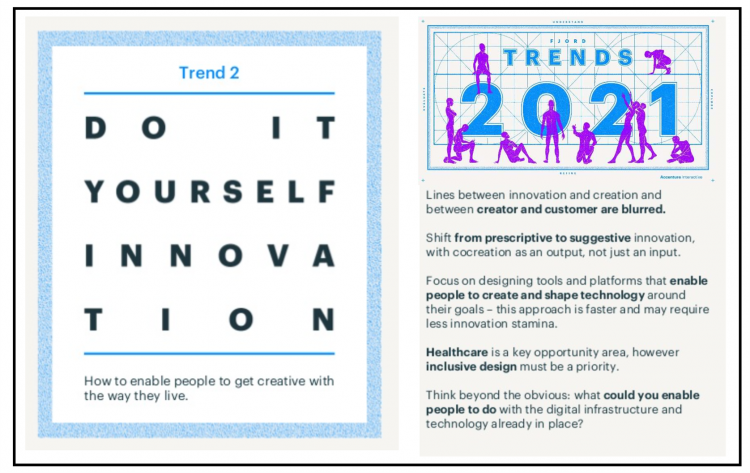
The pandemic has digitally transformed those people who could work from home, school at home, and undertake daily life-flows as health citizens tried to keep the coronavirus (and other people) at-a-distance. “Emerging hand-in-hand with place displacement, activity displacement is simply about the change in how people do things. Almost overnight, school lessons and doctors’ appointments were online. Yoga classes, concerts and weddings were streamed via Zoom,” Fjord Trends 2021 from Accenture Interactive observes. “Historically, people have often been quick to adopt new digital technology and slower to adapt to what it can help them achieve,” Fjord noted. But COVID-19 has
The Coronavirus Pandemic Turbocharged Digital Health Investment in 2020
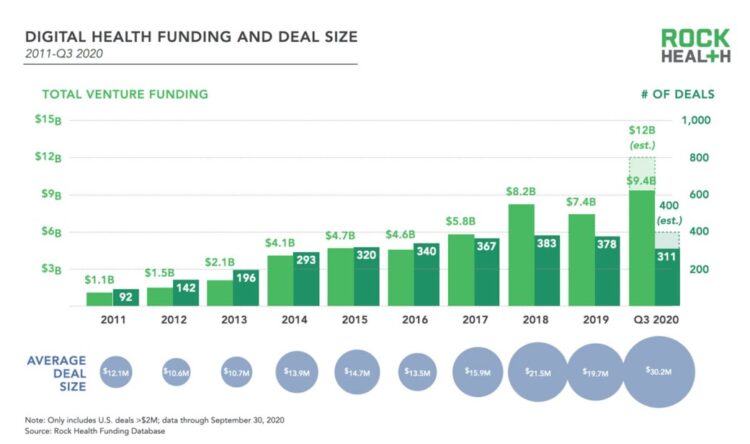
2020 will be remembered for disruption and dislocation on many fronts; among the major blips in the year will be it remembered as the largest funding year for digital health recorded, according to Rock Health’s report on the 3Q2020 digital health funding. This funding record (“already” before year-end, tallied by the third quarter as Rock Health notes) was driven by “mega”-deals accelerated during the public health crisis of COVID-19. In the third quarter of 2020, some $4 billion was invested in U.S. based digital health start-ups adding up $9.4 billion in 2020….so far. This is $1.2 billion more than two
Health Consumers Keen to Share and Download Data, But Privacy Remains a Concern
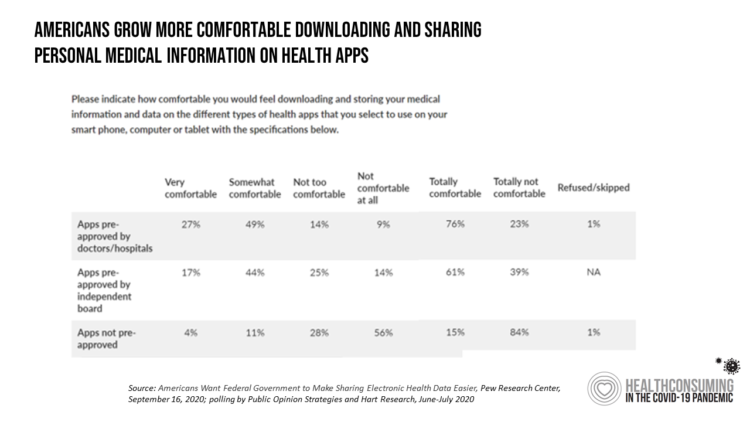
People in the U.S. are growing their health IT muscles and literacy, accelerated in the coronavirus pandemic. In particular, health consumers in America want more access to their personal health data, a study from the Pew Research Center has found in Americans Want Federal Government to Make Sharing Electronic Health Data Easier. Pew collaborated with Public Opinion Strategies and Hart Research to conduct a survey in June and July 2020 among 1,213 U.S. adults 18 and over to determine peoples’ perspectives on personal health information in light of their pandemic era experiences. This study re-confirms the current state of the health
Data Well-Being: A Pillar of Health Citizenship for US Consumers
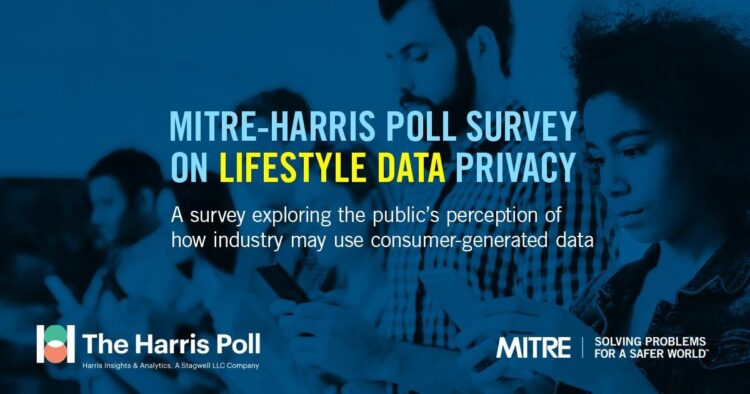
In the COVID-19 era, most U.S. consumers believe they have an obligation to share personal health information to stop the spread of the coronavirus. However, only 44% would be willing to share their personal data with a national database, a MITRE study learned. Only one-third of Americans would be willing to share their temperature, 29% their location, and one-fourth information about their chronic conditions. The Harris Poll conducted the study among 2,065 U.S. adults 18 and over in mid-June 2020 to gauge peoples’ perspectives on health data and privacy. Three-quarters of people in the U.S. believe that data privacy “is a
The Home and Low-Touch Health Care – a Health Consumer Update from Capgemini
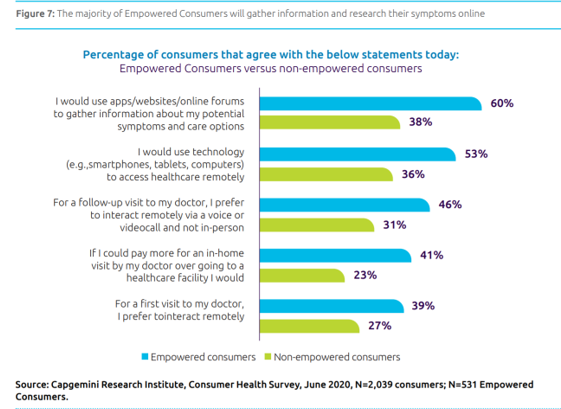
The coronavirus pandemic has been a wake-up call for patients-as-consumers, seeking lower-touch health care services at home or closer-to-home in community health hubs. The need for a holistic platform the serves up a continuum-of-care tools across the patient journey became evident in a matter of months, Capgemini Research Institute calls out in The Health Fix, a research report assessing peoples’ perspectives on health care in the Age of COVIOD-19. Capgemini conducted a survey among over 2,000 consumers living in France, Germany, the United Kingdom, and the U.S. in mid-June 2020. The report found three big shifts in global health citizens’
A New Era of Virtual Care Has Begun, Accenture Finds
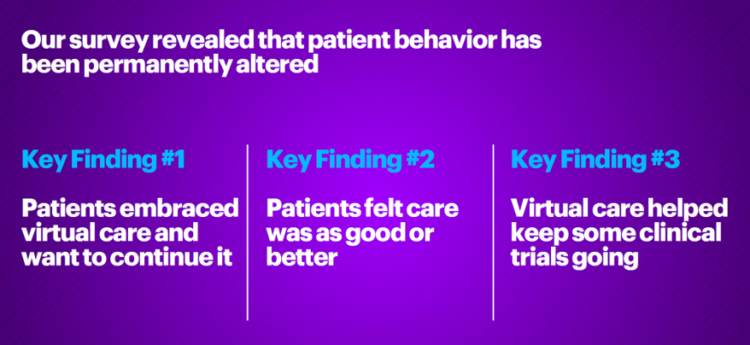
Patients embraced virtual care and communications at very high rates in the first months of the pandemic, and want to continue to use telehealth platforms after the pandemic ends. The new era of virtual care has begun and is here to stay, Accenture expects in its latest look at How COVID-19 will permanently alter patient behavior, a patient survey conducted in May 2020. Accenture polled 2,700 patients around the world, 450 participants each from China, France, Germany, Japan, the U.K., and the U.S. Patients represented one of three conditions, with one-third each managing cardiovascular, immunology/rheumatology, and oncology. Topline, consumers “faced
How Philips Has Pivoted In the COVID-19 Pandemic: Connected Care From Hospital to Home
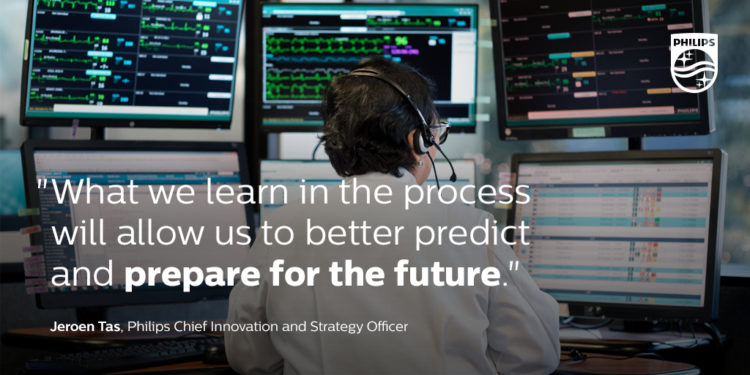
What a difference 90 days makes. I was scheduled to meet with Roy Jakobs, Chief Business Leader of Connected Care at Philips, at HIMSS in Orlando on 9th March 2020. I’d interviewed Roy at CES 2020 in Las Vegas in January to catch up on consumer health developments, and the March meeting was going to cover Philips’ innovations on the hospital and acute care side of the business, as well as to learn more about Roy’s new role as head of Connected Care. HIMSS cancelled the conference just days before it was to commence….due to the great disruption of COVID-19.
Addressing Health Equity Must Include Digital Equity Beyond Access To Medical Services and Insurance
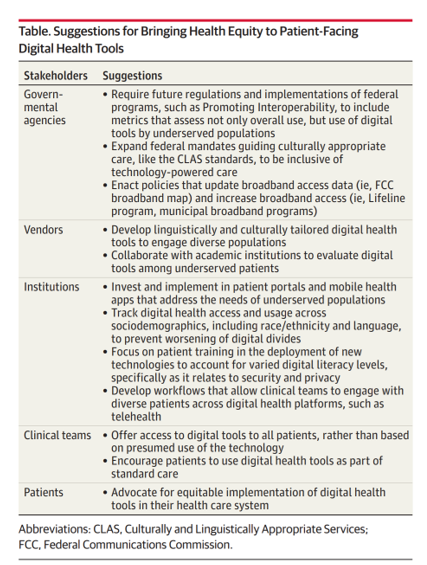
The 21st Century Cures Act emphasizes patients’ control of personal health information. ONC rules issues in March 2020 called for more patient-facing health tools and apps to bolster health consumer engagement and empowerment. But the emergence of the coronavirus in the U.S. revealed many weakness in the American health care system, one of which has been health inequities faced by millions of people — especially black Americans, who have sustained higher rates morbidity and mortality for COVID-19. There have also been digital health divides found in the COVID-19 pandemic, discussed in a timely essay in JAMA, Digital Health Equity as
Consumers’ Embrace of Digital Health Tech Stalls, and Privacy Concerns Prevail – Accenture’s 2020 Research
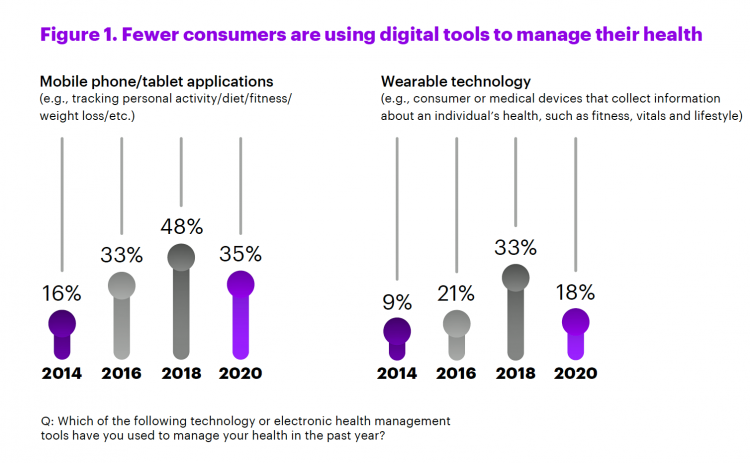
Millions of dollars and developers’ time have been invested in conceiving and making digital health tools. Yet with that bullish supply side of digital health, there was a marked decline in peoples’ use of them in the past two years, found by Accenture in their latest health consumer survey, Digital is Transforming Health, So Why is Consumer Adoption Stalling? Use of mobile apps to track personal health activity fell from nearly 1 in 2 consumers to 1 in 3. Use of wearable tech nearly halved, from 33% to 18%, between 2018 and 2020. Some, but not necessarily a majority, of
Why CTA’s Shepherding AI Is Important for Re-Imagining Healthcare
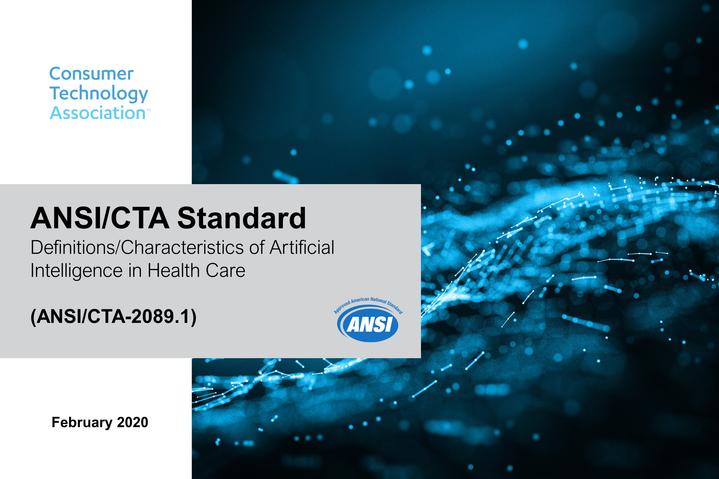
The Consumer Technology Association (CTA), collaborating with industry stakeholders, has ushered in a standard for artificial intelligence in health care. CTA is the membership organization for companies that innovate, manufacture and market consumer-facing tech like big-screen TVs, slick new autos, video games and voice assistants. So what’s an organization like CTA doing with AI and health care? Let me connect the dots. Check out this graphic taken from my book, HealthConsuming: From Health Consumer to Health Citizen. This shows the ten categories of tech I revisit each year at CES, CTA’s annual mega-conference of new-new things in consumer electronics
The Pace of Tech-Adoption Grows Among Older Americans, AARP Finds – But Privacy Concerns May Limit Adoption
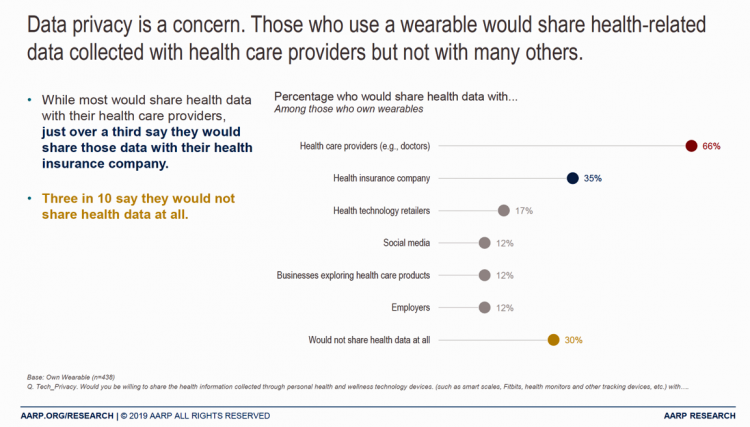
One in two people over 50 bought a piece of digital technology in the past year. Three in four people over fifty in America now have a smartphone. One-half of 50+ Americans use a tablet, and 17% own wearable tech. The same percentage of people over 50 own a voice assistant, a market penetration rate which more than doubled between 2017 and 2019, AARP noted in the 2020 Tech and the 50+ Survey published in December 2019. For this research, AARP worked with Ipsos to survey (online) 2,607 people ages 50 and over in June and July 2019. Across all
Dr. Roboto? Stanford Medicine Foresees Digital Doctors “Maturing”
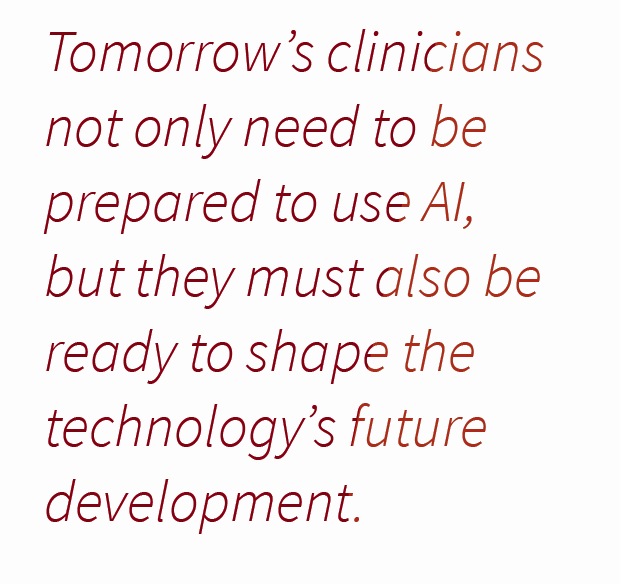
Physicians are evolving as digital doctors, embracing the growing role of data generated in electronic health records as well as through their patients using wearable technologies and mobile health apps downloaded in ubiquitous smartphones, described in The Rise of the Data-Driven Physician, a 2020 Health Trends Report from Stanford Medicine Stanford Medicine interviewed 523 physicians and 210 medical students and residents in September and October 2019 to assess clinicians’ perspectives on digital health topics for this study. The study title citing the “data-driven physician” is based on the key survey finding that doctors are preparing to embrace data, from both traditional
In 2020, PwC Expects Consumers to Grow DIY Healthcare Muscles As Medical Prices Increase
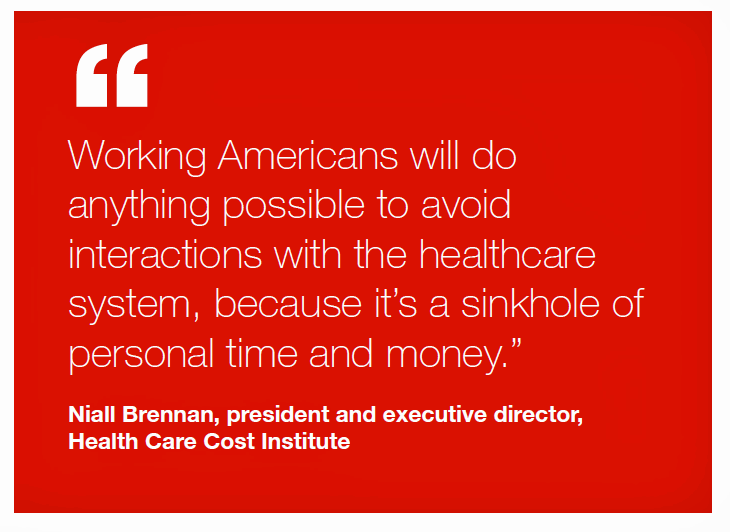
The new year will see a “looming tsunami” of high prices in healthcare, regulation trumping health reform, more business deals reshaping the health/care industry landscape, and patients growing do-it-yourself care muscles, according to Top health industry issues of 2020: Will digital start to show an ROI from the PwC Health Research Institute. I’ve looked forward to reviewing this annual report for the past few years, and always learn something new from PwC’s team of researchers who reach out to experts spanning the industry. In this 14th year of the publication, PwC polled executives from payers, providers, and pharma/life science organizations. Internally,
Despite Greater Digital Health Engagement, Americans Have Worse Health and Financial Outcomes Than Other Nations’ Health Citizens
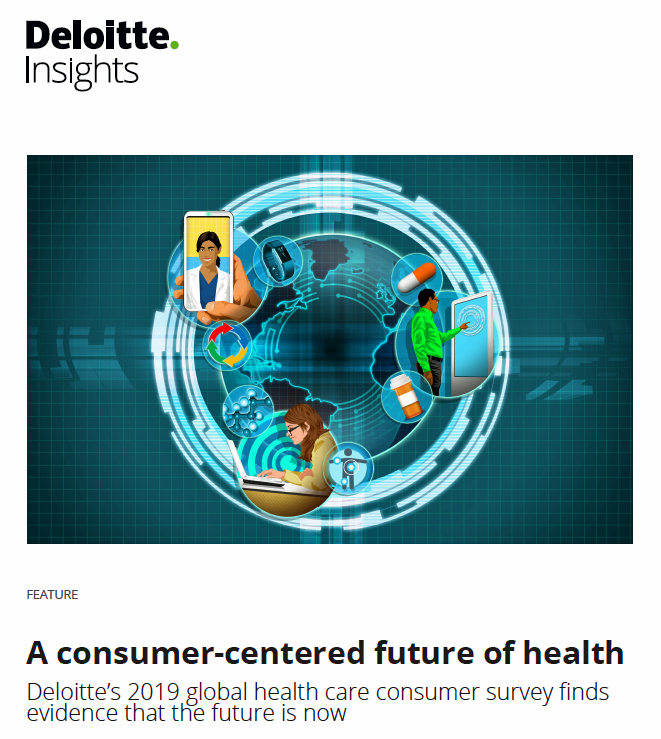
The idea of health care consumerism isn’t just an American discussion, Deloitte points out in its 2019 global survey of healthcare consumers report, A consumer-centered future of health. The driving forces shaping health and health care around the world are re-shaping health care financing and delivery around the world, and especially considering the growing role of patients in self-care — in terms of financing, clinical decision making and care-flows. With that said, Americans tend to be more healthcare-engaged than peer patients in Australia, Canada, Denmark, Germany, the Netherlands, Singapore, and the United Kingdom, Deloitte’s poll found. Some of the key behaviors
Most Health Consumers Expect Technology To Play a Larger Role As Tech-Angst & Privacy Concerns Grow

As technology continues to re-shape consumers’ experiences and expectations with health/care, retail, travel and work, peoples’ concerns about data privacy are also growing as observed by a 2020 consumer trends forecast from GlobalWebIndex, Connecting the dots. First, some overall context to the study. GlobalWebIndex “connects the dots” of consumers trends in 2020 including the topics shown in the first graphic including commerce and retail, gaming, travel, human touch, nostalgia, privacy and digital health — the first of these trends discussed in the report. Note that the data discussed in this post include responses from consumers residing in both the U.S.
Will Technology Cure Americans’ Health Care System Ills? Considering Google and Ascension Health’s Data Deal

“Google’s ‘Project Nightingale’ Gathers Personal Health Data on Millions of Americans,” the Wall Street Journal reported in today’s paper and on the WSJ.com website. The story started with the scenario that, “Search giant is amassing health records from Ascension facilities in 21 states; patients not yet informed.” Here’s Ascension’s press release on the collaboration, described in the title as “healthcare transformation.” Note: this release was written after the Wall Street Journal published this story. And, according to the WSJ reporting, “Neither patients nor doctors have been notified. At least 150 Google employees already have access to much of the data
A Health Future with Lyft and Uber as Patient Data Stewards: Rock Health’s 2019 Consumer Survey
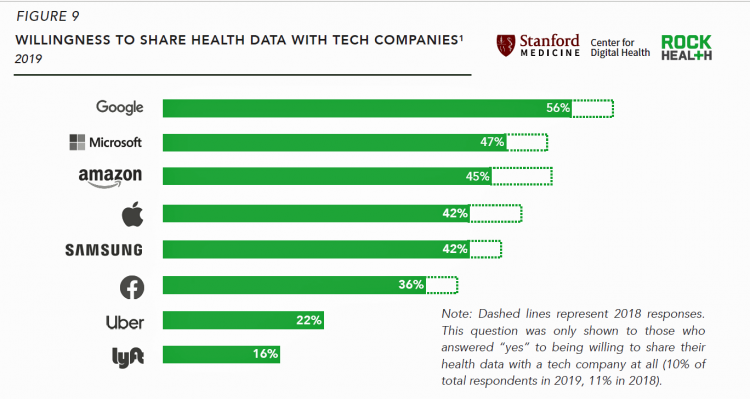
Patients searching online for health information and health care provider reviews is mainstream in 2019. Digital health tracking is now adopted by 4 in 10 U.S. consumers. Rock Health’s Digital Health Consumer Adoption Report for 2019 was developed in collaboration with the Stanford Medicine Center for Digital Health. Rock Health’s research has tracked peoples’ use of telemedicine, wearable technology, digital health tracking, and online health information since 2015, and the results this round show relative flattening of adoption across these various tools. Rock Health’s top-line findings were that: Patient-generated health data creates opportunity, and potential challenges Online health information is
Making Health Care Better, from the N of 1 to the Public’s Health – Trend-Weaving Medecision Liberation 2019
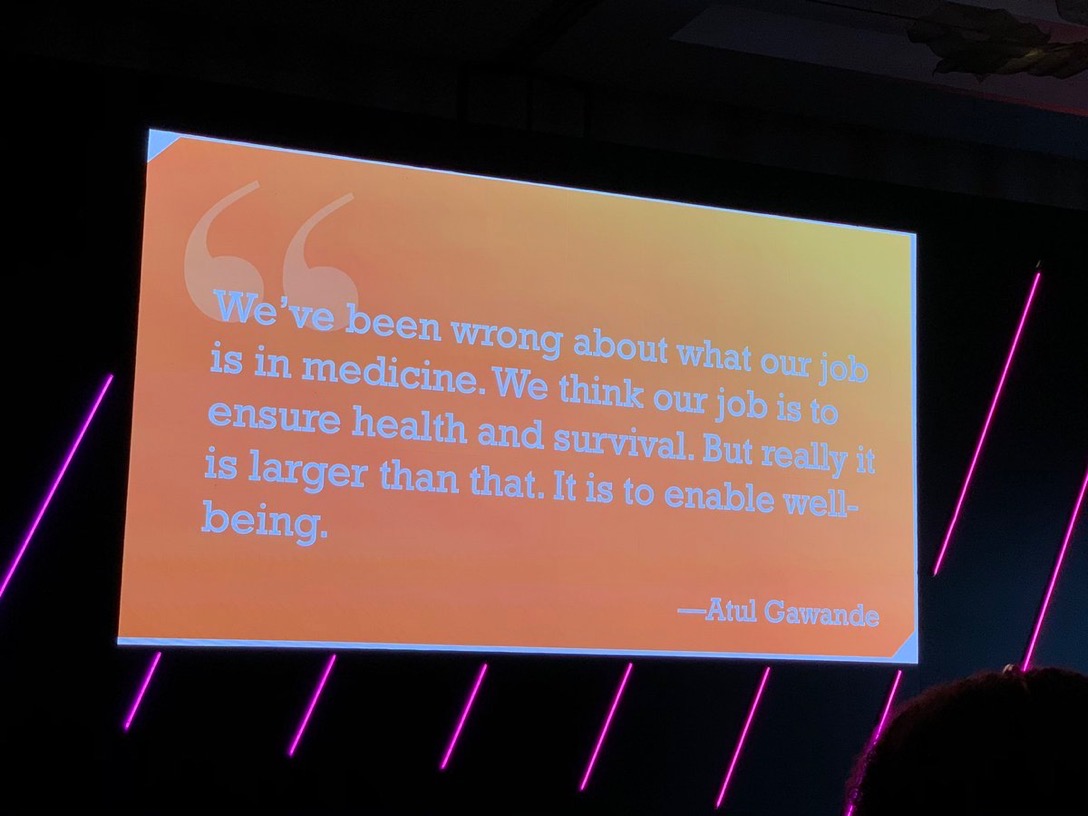
Health and our health information are deeply personal. Changing health care and inspiring positive health behaviors is hard to do. But we must and we will, a group of inspiring and inspired people who work across the health/care ecosystem affirmed this week in Dallas at the conference of Medecision Liberation 2019. I was engaged at this conference to wear several hats — as a keynote speaker, a sort of “emcee,” and, finally, to trend-weave the many talks and discussions happening throughout the meeting. This post is my synthesis of the summary I delivered live at the end of the conference,
Listening to Osler Listening to the Patient – Liberating Health Care at Medecision Liberation 2019
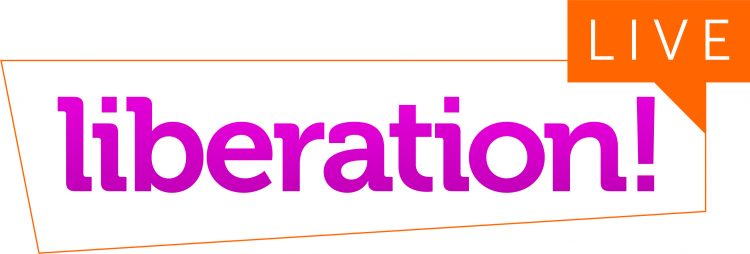
“Listen to your patient; he is telling you the diagnosis,” Dr. William Osler is quoted to have said around the turn of the 20th century. Dr. Osler had been a strong advocate for the physician-patient conversation to inform the doctor’s diagnostic acumen and improve patient outcomes. This year is the centennial of Dr. Osler’s passing, so it’s especially timely that I introduce this post with his legendary assertion in the context of kicking off the 2019 Medecision Liberation conference. This meeting convenes the company’s clients, partners, and staff to share best practices, spark insights and learnings, and enable networking between
Patients Growing Health Consumer Muscles Expect Digital Services
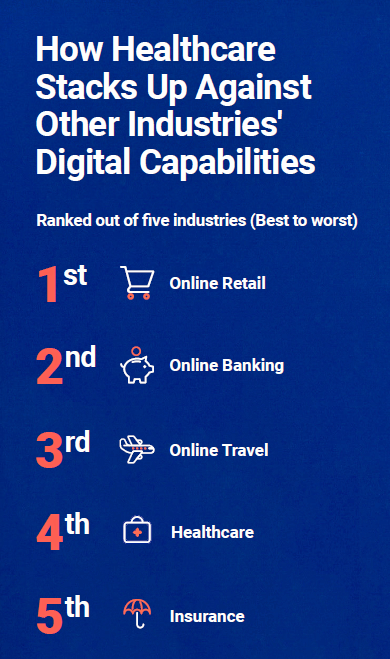
Patients’ experiences with the health care industry fall short of their interactions with other industries — namely online retail, online banking and online travel, a new survey from Cedar, a payments company, learned. Survata conducted the study for Cedar among 1,607 online U.S. consumers age 18 and over in August and September 2019. These study respondents had also visited a doctor or hospital and paid a medical bill in the past year. One-third of these patients had a health care bill go to collections in the past year, according to Cedar’s 2019 U.S. Healthcare Consumer Experience Study. Among those people
Prelude to Health 2.0 2019: Thinking Consumers At the Center of Digital Health Transformation

“Digital transformation” is the corporate strategy flavor of the moment across industries, and the health are sector isn’t immune from the trend. As this 13th year of the annual Health 2.0 Conference kicks off this week, I’m focused on finding digital health innovations that engage people — consumers, caregivers, patients, health citizens all. This year’s conference will convene thought leaders across a range of themes, and as is the Health 2.0 modus operandi, live demo’s of new-new things. As Health 2.0 kicks off today in pre-conference sessions, there is useful context described in a new report from the American Hospital
Health Consumers Expect Healthcare to be Digital (and Secure), Philips Future Health Index Finds

Health care system financing, delivery, and workflows widely vary across nations around the world. Philips surveyed health care professionals and consumers living in 15 countries, from North America to Asia, and found that these health systems share one over-arching objective: to provide quality care with improved experiences for both patients and healthcare professionals. Being Philips, what underpins that quality and experience is technology; Philips explored telehealth, AI, digital health records (DHRs), and other digital health tools that can engage patients. Philips published results from this global study in The Future Health Index 2019, themed “Transforming healthcare experiences, exploring the impact
Healthcare Just Got SMAC’ed – Accenture’s Post-Digital Era for Health
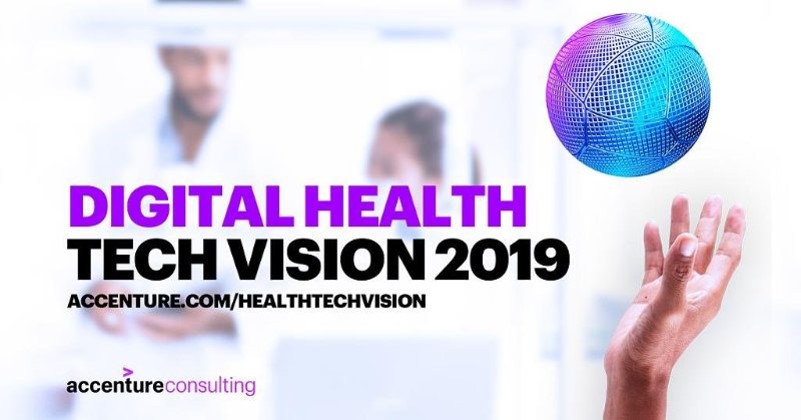
Social, mobile, analytics and the cloud now underpin the health care industry. We’ve been SMAC’ed, and Accenture’s Digital Health Tech Vision 2019 believes we’re in a post-digital era ripe with opportunity. Five trends comprise the Vision: DARQ Power, the acronym for Distributed ledger technology, Artificial intelligence (AI), extended Reality, and Quantum computing. Adopting these applications can help health care reduce costs, drive labor efficiency and support people-centered design and experience. Get to Know Me is the use of technology to develop and deepen relationships with people. As an example of this trend, Accenture points to Mindstrong which leverages AI and
The Persistent Rural/Urban Broadband Gap Is Bad for Health
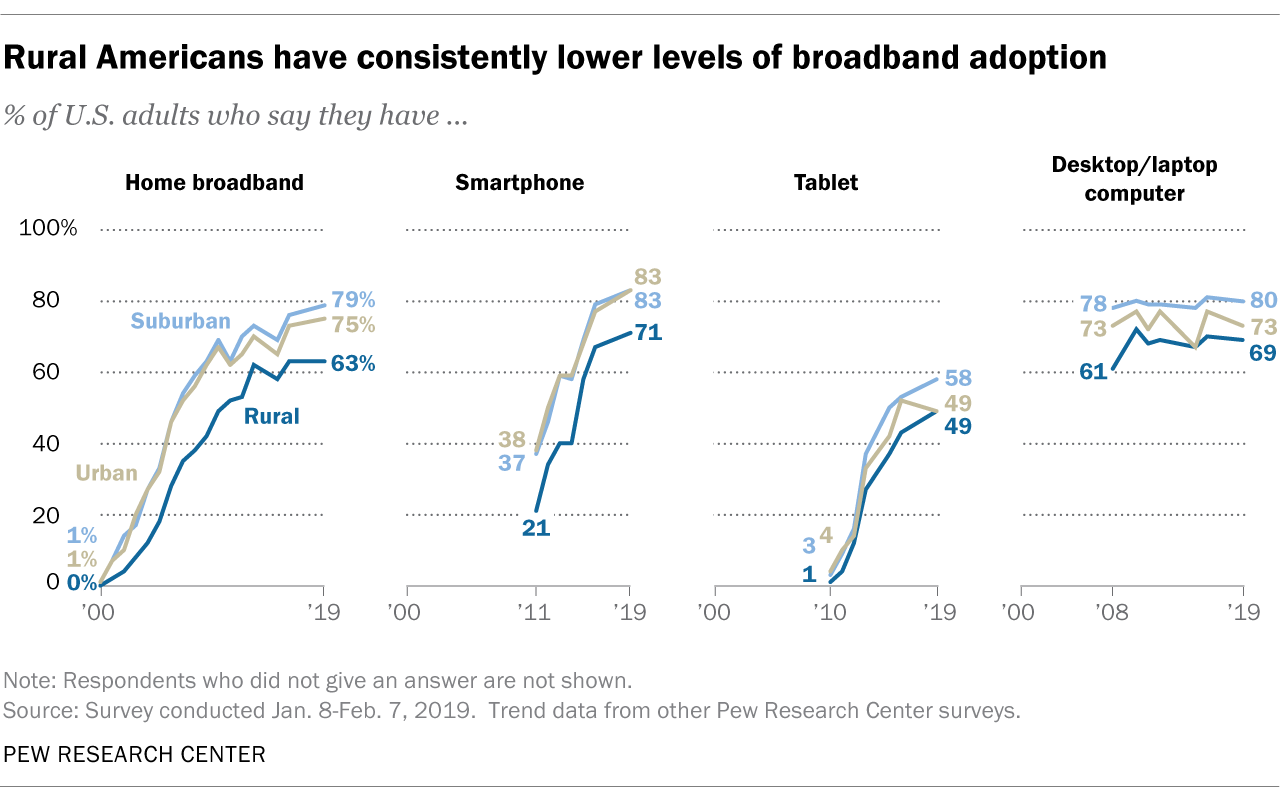
In the U.S., rural residents’ access to broadband at home continues to lag behind urban and suburban dwellers, the Pew Research Group noted in a May 2019 research note on Americans’ use of technology. The Pew survey explored Americans’ adoption of technology and found that rural dwellers are also less likely to have multiple devices than non-rural consumers. Across the four types of tech studied, it’s smartphones that top the list of penetration in rural areas (at 71%), closely followed by computers (desktop or laptop, with 69% adoption), broadband (at 63%) and tablets
Assessing the GAO’s Report on Single-Payer Healthcare in America: Let’s Re-Imagine Workflow

Calls for universal health care, some under the banner of Medicare for All,” are growing among some policy makers and presidential candidates looking to run in 2020. As a response, the Chairman of the House Budget Committee in the U.S. Congress, Rep. John Yarmuth (D-Ky.), asked the Congressional Budget Office (CBO) to develop a report outlining definitions and concepts for a single-payer health care system in the U.S. The result of this ask is the report, Key Design Components and Considerations for Establishing a Single-Payer Health Care System, published on 1st May by the CBO. The report provides
Americans’ Trust in U.S. Healthcare Lags Tech — and Women Are Particularly Cynical
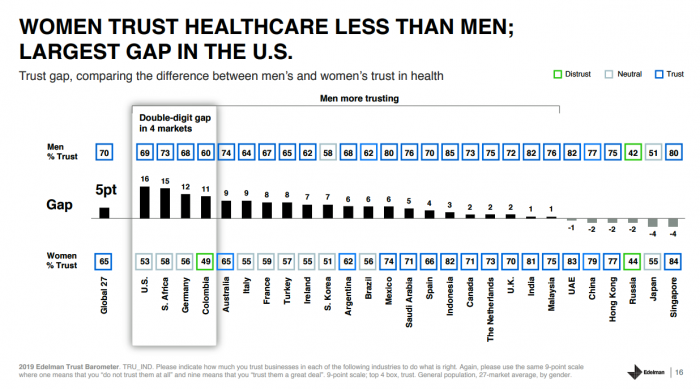
The 2019 Edelman Trust Barometer measured the biggest gap in trust for the healthcare industry between the U.S. “informed public” and the mass population. Fewer American women, too, trust the healthcare industry than men do. “This inequality of trust may be reflective of the mass population continuing to feel left behind as compared to others, even as they recognize the advances that are being made that could benefit them. Given tone and tenor of the day, and particularly among mass population, healthcare may continue to see increasing demands for change and regulation,” Susan Isenberg, Edelman’s head of healthcare, notes in
Deep Human Interactions: The Antidote To More AI In Health Care – Learning From Philips’ CEO At HIMSS19
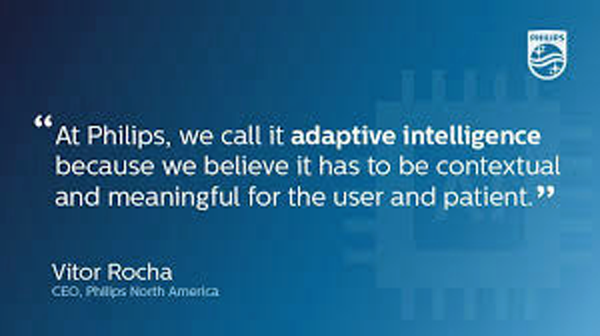
“The promise of AI is undeniable…could AI help clinicians deliver better and more humanistic care?” This question is asked and answered in a JAMA viewpoint published January 1/8 2019 titled, Humanizing Artificial Intelligence. This theme motivated a conversation held over a dinner convened by Philips hosted by Frans Van Houten this week at HIMSS19. To provide context Geoff Colvin, Fortune‘s Senior Editor, first talked about taking friction out of industries, as Lyft and Uber have done in the transport sector. “Taking friction out of industries challenges and changes business models,” Geoff noted. With Uber’s IPO valuation approaching $100 billion, I’d say that’s
The Smartphone Is the Consumer’s Personal Health Platform – Implications from Deloitte’s 2018 Survey

American consumers are now viewing their phones an average of 52 times daily, with 39 percent of consumers believing they use their smartphones too much. In fact, 60 percent of 18 to 34-year-olds admit to smartphone overuse, the highest level of any age group. However, 63 percent of the respondents reported trying to limit their smartphone usage, roughly half succeeding in cutting back. Smartphones also are helping blur the lines between work and leisure with 70 percent of respondents using personal smartphones at least occasionally for after-hours work. Furthermore, voice technologies are “making noise,” according to Deloitte in A New Era
Loneliness, Public Policy and AI – Lessons From the UK For the US
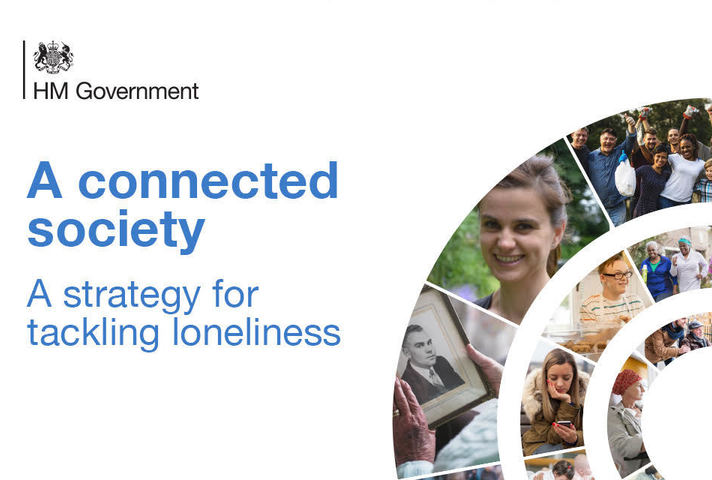
There’s a shortage of medical providers in the United Kingdom, a nation where healthcare is guaranteed to all Britons via the most beloved institution in the nation: The National Health Service. The NHS celebrated its 70th anniversary in July this year. The NHS “supply shortage” is a result of financial cuts to both social care and public health. These have negatively impacted older people and care for people at home in Great Britain. This article in the BMJ published earlier this year called for increasing these investments to ensure further erosion of population and public health outcomes, and to prevent
The Single Market for Healthcare in Europe: Learnings for the U.S.

When I asked my longtime colleague and friend Robert Mittman, with whom I collaborated at Institute for the Future for a decade, how he managed international travel and jet lag, he said simply, “The time zone you’re in is the time zone you’re in.” This lesson has stayed with me since I received Robert’s advice over twenty years ago. Over the next two weeks, as I work alongside colleagues and clients in the EU and soon-to-Brexit UK, I am in time zones five and six hours later than my home-base of US Eastern Time. But the time zones I’m working
How Digital Health Can Stimulate Economic Development

It’s National Health IT Week in the US, so I’m kicking off the week with this post focused on how digital health can bolster economic development. As the only health economist in the family of the 2018 HIMSS Social Media Ambassadors, this is a voice through which I can uniquely speak. In February 2009, President Barack Obama signed into law the American Recovery and Reinvestment Act (ARRA), less formally known as the Stimulus Bill. This was the legislation best known for addressing and helping to bring the U.S. out of the Great Recession. A lesser-known component of ARRA was Title
The Digital Health Consumer According to Rock Health
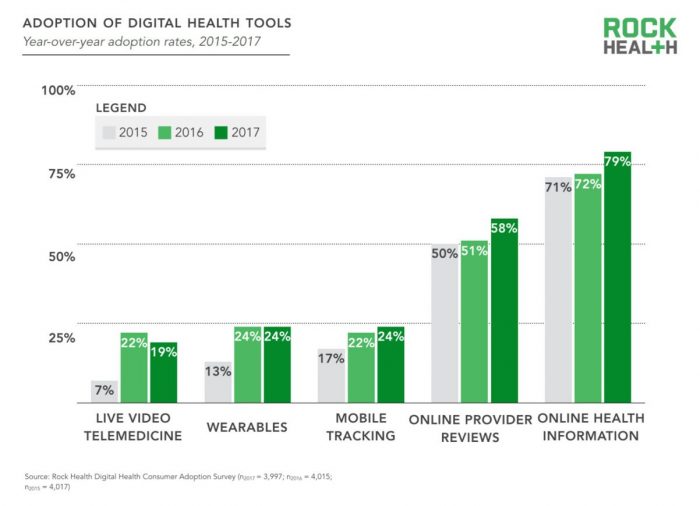
Looking for health information online is just part of being a normal, mainstream health consumer, according to the third Rock Health Digital Health Consumer Adoption Survey published this week. By 2017, 8 in 10 U.S. adults were online health information hunters. Six in 10 Americans looked for reviews of healthcare providers online, another new-normal consumer digital health activity. But only one in four people had used wearable technology for health, and one in five had participated in a live video telemedicine encounter. The Rock Health team observes that “the needle has not moved equally across every type of digital health solution.” Thus the
Disruption Is Healthcare’s New Normal
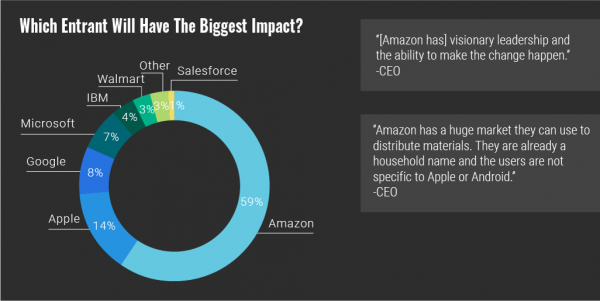
Googling the words “disruption” and “healthcare” today yielded 33.8 million responses, starting with “Riding the Disruption Wave in Healthcare” from Bain in Forbes, Accenture’s essay on “Big Bang Disruption in Healthcare,” and, “A Cry for Encouraging Disruption” in the New England Journal of Medicine Catalyst. This last article responded to the question, “Can we successfully deliver better quality care for patients at a lower cost?” asked by François de Brantes, Executive Director of the Health Care Incentives Improvement Institute. “Disruption” as a noun and an elephant in our room has been with us in healthcare since the September/October 2000 issue of
Healthcare’s Profits Will Be Dramatically Redistributed as Care Shifts to Consumers: Accenture
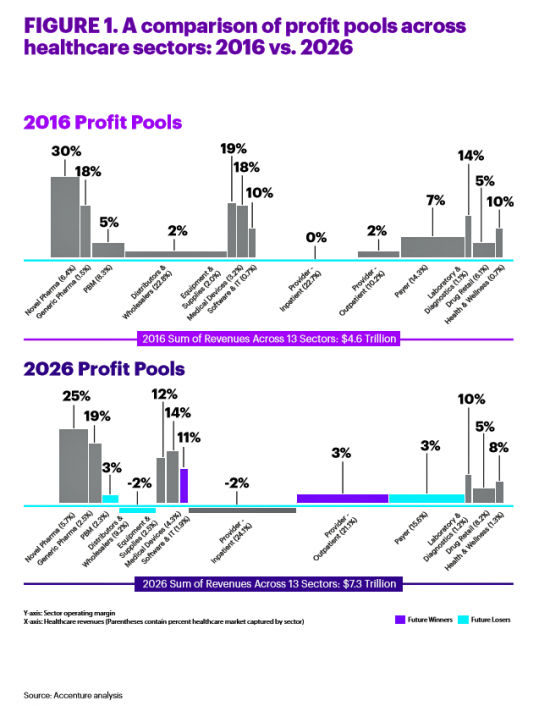
All sectors who are stakeholders in the healthcare ecosystem aren’t created equal, Accenture explains in their report, Healthcare’s future winners and losers. Observing the influx of new flavors of entrants like Amazon and Google, start-ups like Iora Health, Oscar and FetchMD, begs the question: how will legacy healthcare system players fare? Who will survive, and what will be the success factors that bolster long-term viability? To answer that question, Accenture points to three market trends that set “new rules” in healthcare: Blurred lines, which are the grey areas and adjacencies between technology, service, finance, and retail The middle of nowhere,
Closing the Digital Health Gap Between Consumers and Physicians
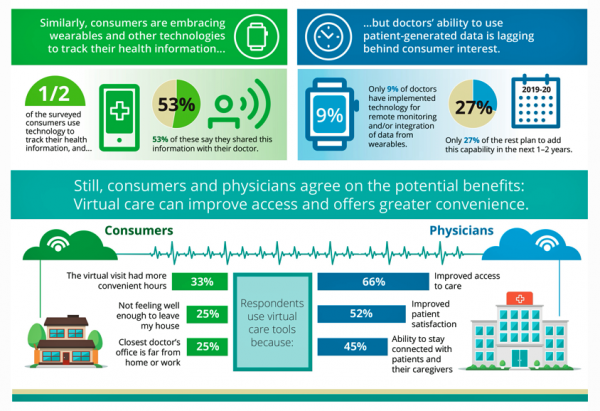
Consumers are more bullish demanding virtual and digital health tools from their physicians than doctors are in providing it, based on the research findings in What can health systems do to encourage physicians to embrace virtual care? from Deloitte. One-third of physicians have concerns about using virtual care services, such as medical errors that may result, access to technology, and data security. One in two U.S. consumers are now tracking health via digital tools, and one-half of these share the data generated by their apps. That sharing is limited by doctors’ ability to
If Data Is The New Oil in Healthcare, Will It Be Safe to Drink? The Accenture Digital Health Tech Vision 2018
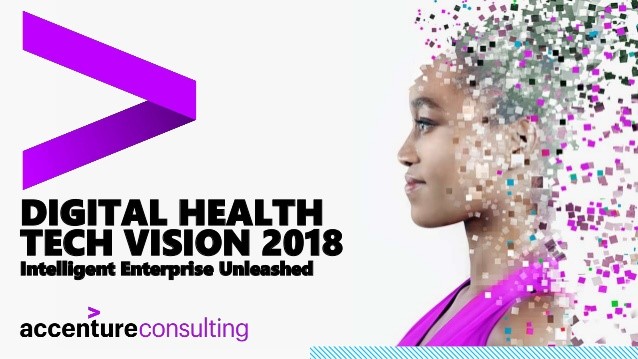
With the vast majority of patients’ medical records now digitized in electronic health records systems, the opportunities to mine, learn from, and act on the findings are promising for U.S. healthcare. More data is moving into internet clouds every day, from healthcare encounters with clinicians and inpatient hospital stays to prescribed medicines, retail receipts for over-the-counter remedies, wearable technologies, credit card swipes for products and services, and GPS check-ins. That’s a treasure trove of digital footprints that can tell a lot about us as patients, either in real-time or via prediction. But can we nudge stakeholders in health and healthcare
Doctors Say EHRs Are Good for Storage, But Risky for Patient Relationships and Burnout

Doctors have a complicated relationship with electronic health records (EHRs): two-thirds of primary care providers (PCPs) see value in digital records (EHRs), but at the same time believe the technology has weakened relationships with patients, detracted from clinical effectiveness, and lack streamlined user experience. That deficiency is, in three words, lack of interoperability; that challenge has required one-half of physician-users to use work-around’s to make their EHR investments more useful. These insights come out of a survey conducted among primary care providers by The Harris Poll for Stanford Medicine, published to coincide with the medical school’s convening of the EHR
How to Make Healthcare More Intelligent and Trustworthy: Accenture’s Digital Health Tech Vision 2018

“Do no harm” has been the professional and ethical mantra of physicians since the Hippocratic Oath was first uttered by medical students. The origins of that three-word objective probably came out of Hippocrates’ Corpus, which included a few additional words: “to do good or to do no harm.” The proliferation and evolution of digital technologies in health care have the potential to do good or harm, depending on their application. Doing good and abstaining from doing harm can engender trust between patients, providers, and other stakeholders in health. Trust has become a key currency in provider/patient/supplier relationships: 94% of health executives
Re-Imagining Healthcare – a Lesson from Von Clausewitz in the Fog of War

When you’re on the battlefield and you can’t see what lies ahead, go high, recommended General Von Clausewitz in his book, On War. I paraphrase this prescription from the good General-strategist’s book, On War — “War is the realm of uncertainty; three-quarters of the factors on which action in war is based are wrapped in a fog of greater or lesser uncertainty. A sensitive and discriminating judgment is called for; a skilled intelligence to scent out the truth.” Governor Mark Leavitt, who held the post of Secretary of Health and Human Services under President Bush, offered this advice at the recent Liberation
Using Design to Liberate Healthcare; Learning from Dr. Andrew Chacko and Tan Le

This is the second post of three written to summarize what I learned participating in Medecision’s annual meeting with the company’s partners, held March 27-29, 2018 at the Ritz-Carlton in Dallas, TX. I concluded the first of this three-part series with Dr. Don Rucker’s belief that, “Patients are the massive use-case for interoperability.” This second post focuses on the key role of designing for healthcare – for patients, caregivers, providers, all industry sector workers indeed. And designing information to make it beautiful, useable, meaningful. You’ll read about Renaissance Man/Doctor Andrew Chacko MD, a board-certified physician, French and Physics student at the Naval
Nudging Patients to Use EHRs: Moving Toward a Tipping Point for Consumer Health IT
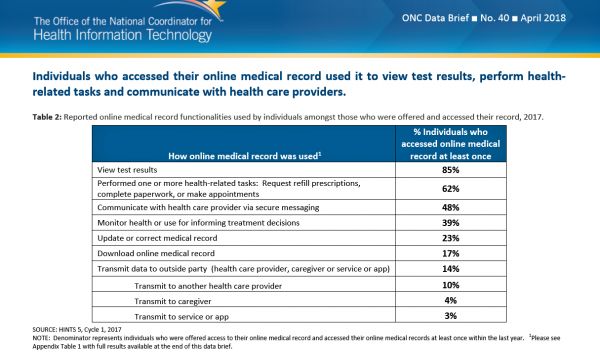
Half of U.S. patients were offered online access to their health records by providers or insurers, and one-half of them accessed the EHR at least once in the last year. One in four of those offered online EHR access looked at them more than 3 times. It takes a good nudge from a provider to motivate a patient to access online medical records, found by ONC in their latest research into consumers’ use of EHRs detailed in Individuals’ use of online medical records and technology for health needs, the ONC Data Brief No. 40, published April 2018. he concept of
Consumer Trust, Privacy and Healthcare – Considering #HIMSS18 in the Stark Light of Facebook and Cambridge Analytica
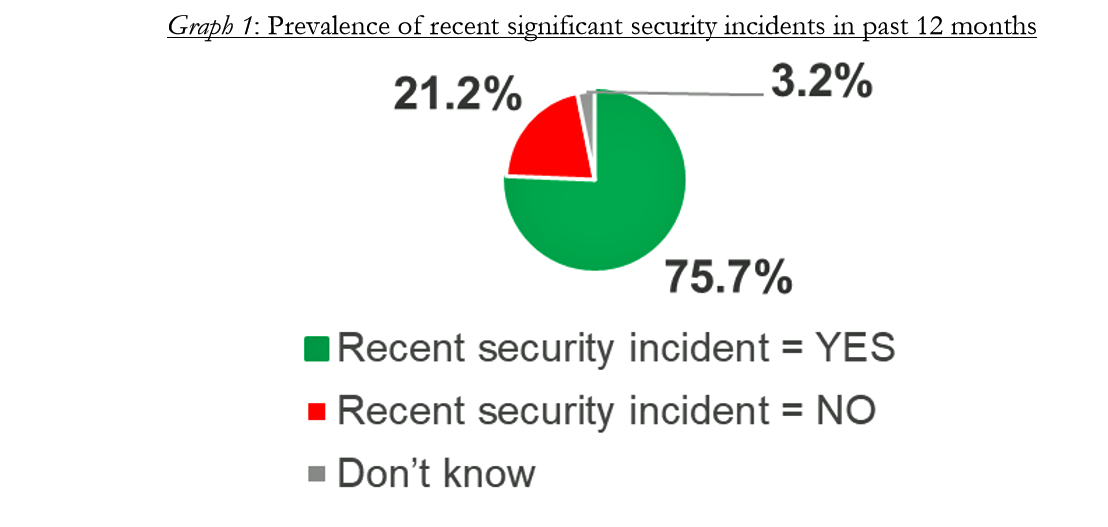
What a difference a couple of weeks make…. On 1st March 2018, two over-arching issues remained with me leaving Las Vegas and #HIMSS18: the central, recognized role of cybersecurity threats in healthcare, and the growing use of consumer-facing technologies for self- and virtual care. Eighteen days later, we all learned about Cambridge Analytica’s misuse of 50 million Americans’ social network data posted on Facebook. We who work in healthcare must pose the questions: going forward, how trusting will patients, consumers and caregivers be sharing their personal health information (PHI)? Will people connect dots between their Facebook lives – and their
How One Hospital System Baked Love Into Their Health App
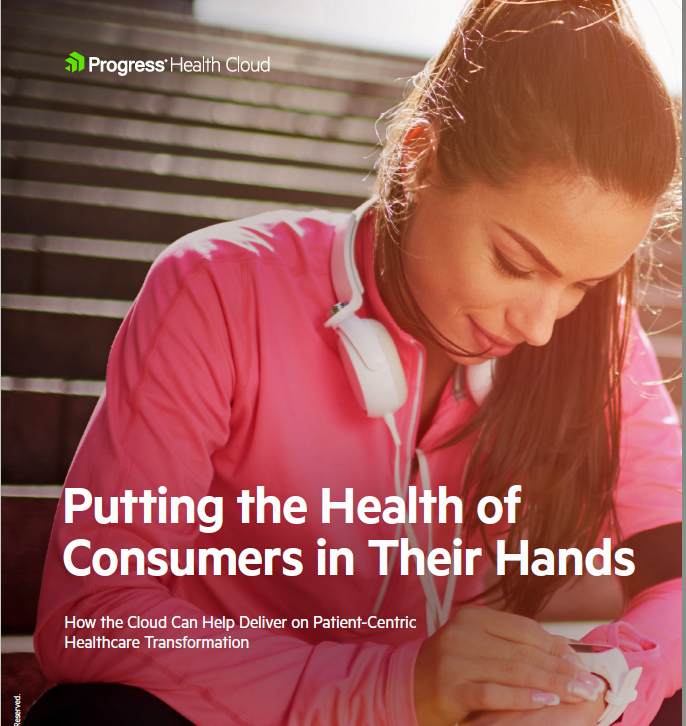
On July 18, 2017, Neil Gomes, Chief Digital Officer at Thomas Jefferson University and Jefferson Health in Philadelphia, tweeted this: When I saw this tweet, I was especially struck by Gomes’s phrase, “Designed & developed with heart/love by my @DICEGRP.” That’s Jefferson’s health solutions group that focuses on digital innovation and consumer experience. Here’s a health system that’s focused on that customer experience, which has become a critical success factor for healthcare to thrive. That’s because, as Steve Laughlin, VP and General Manager of IBM’s Global Consumer Group recently explained to me, a consumer’s last great customer experience becomes the
Add Behavioral Data to Social Determinants For Better Patient Understanding
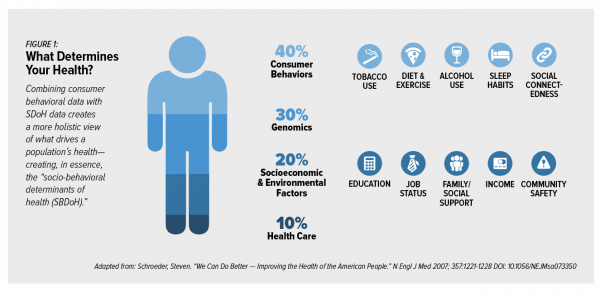
“Health agencies will have to become at least as sophisticated as other consumer/retail industries in analyzing a variety of data that helps uncover root causes of human behavior,” Gartner recommended in 2017. That’s because “health” is not all pre-determined by our parent-given genetics. Health is determined by many factors in our own hands, and in forces around us: physical environment, built environment, and public policy. These are the social determinants of health, but knowing them even for the N of 1 patient isn’t quite enough to help the healthcare industry move the needle on outcomes and costs. We need to
#Engage4Health: How Patients Are Morphing Into Healthcare Consumers, for #HIMSS18
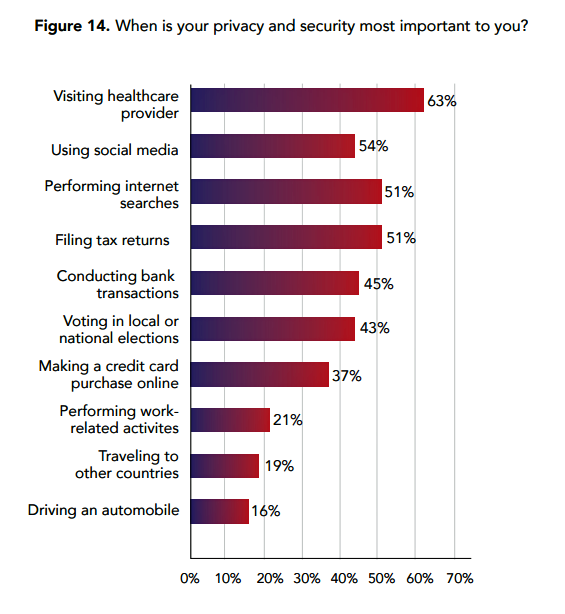
This blog appears today as part of a #HIMSS18 primer series for attendees, and the industry at large, to discuss major health IT issues that will help move health and healthcare delivery forward in 2018 – and beyond. I’m grateful to HIMSS to be one of 20 Social Media Ambassadors appointed for this year’s conference, which convenes in Las Vegas at the Sands Expo Center from March 5 to 9th, 2018. Prioritizing the patient-as-consumer through my health economic lens, the biggest priorities will be: Engaging patients in self-care and driving health and health plan literacy to better manage constrained access
Smarter, Streamlined, Connected Consumers – The Promise of CES 2018

Journalists and industry analysts from around the globe have come to Las Vegas which, this week, is the mecca for new-new electronic things that companies think consumers will be keen to buy. On media day 1, I spoke with a colleague from the Netherlands who covers audio, a sector that’s certainly in disruption; an automotive analyst from India covering autonomous vehicles; and, a mobile tech guru based in Dubai, to identify just a few of my media friends who have gathered here to research and write on their respective beats. In these conversations, there are some common buzzwords floating around
The Cloud’s Growing Role in Consumer-Pharma Health Engagement

The pharmaceutical industry is facing a multitude of political, regulatory, and financial uncertainties in and beyond 2018. But there’s one thing I know for sure about pharma’s morphing business model: it’s that patients are playing a growing role in the industry’s future well-being. That is, if the industry can meet health consumers where they want to be met. Patients want more communication and support from pharma companies, a new study from Accenture found. In fact, over one-third of patients tell their health care providers about pharma patient-service programs: this chart from Accenture’s study illustrates the top seven ways providers hear
Health Consumers Face the New Year Concerned About Costs, Security and Caring – Health Populi’s 2018 Forecast
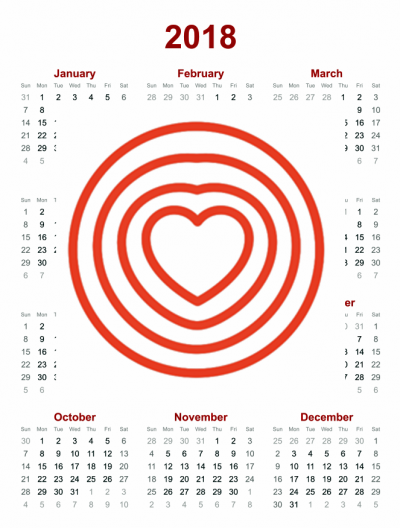
As 2018 approaches, consumers will gather healthy New Year’s Resolutions together. Entering the New Year, most Americans are also dealing with concerns about healthcare costs, cybersecurity, and caring – for physical health, mental stress, and the nation. Healthcare costs continue to be top-of-mind for consumer pocketbook issues. Entrenched frugality is the new consumer ethos. While the economy might be statistically improving, American consumers’ haven’t regained confidence. In 2018, frugality will impact how people look at healthcare costs. 88% of US consumers are likely to consider cost when selecting a healthcare provider, a Conduent survey found. Physicians know this: 81% of
High-Deductibles Do Not Automatically Inspire Healthcare Consumerism
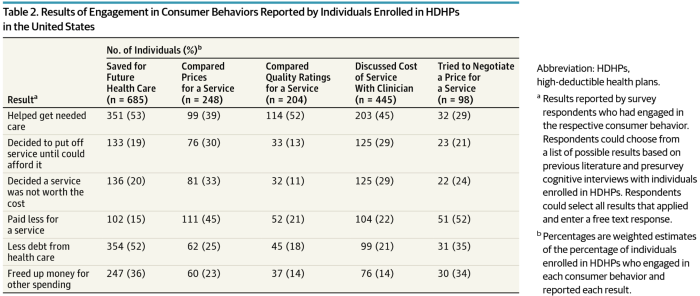
It takes more than enrolling in a high-deductible health plan (HDHP) for someone to immediately morph into an effective health care “consumer.” Research from Dr. Jeffrey Kullgren and his team from the University of Michigan found that enrollees in HDHPs could garner more benefits from these plans were people better informed about how to use them, including how to save for them and spend money once enrolled in them. The team’s research letter was published in JAMA Internal Medicine on 27 November 2017. The discussion details results of a survey conducted among 1,637 people 18 to 64 years of age
What Patients Feel About Technology, Healthcare Costs and Social Determinants
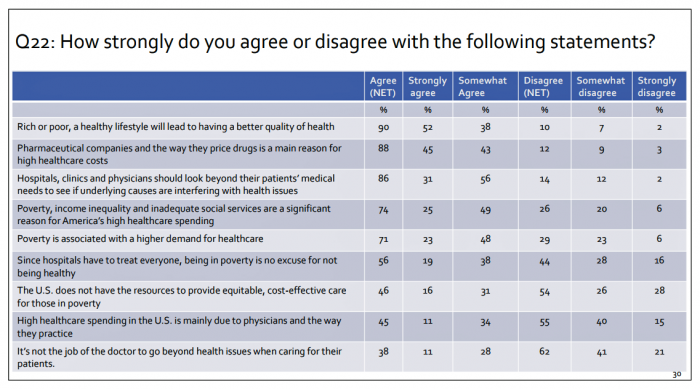
U.S. consumers feel positive about the roles of technology and social determinants in improving healthcare, but are concerned about costs, according to the 2017 Patient Survey Report conducted for The Physicians Foundation. The survey gauged patients’ perspectives across four issues: the physician-patient relationship, the cost of healthcare, social determinants of health, and lifestyle choices. Two key threads in the research explain how Americans feel about healthcare in the U.S. at this moment: the role of technology and the cost of health care. First, the vast majority of consumers view technology, broadly defined, as important for their health care. 85% of people
The Rx is UX: A Prescription for EHRs and Patient Engagement
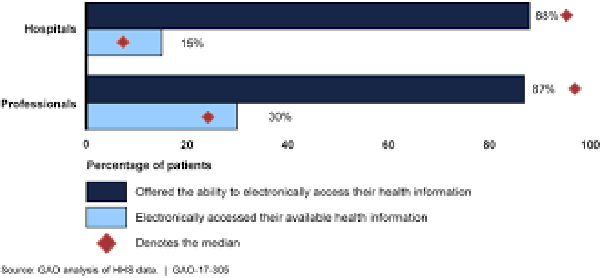
It’s National Health IT Week (#NHIT Week), and I’m revisiting research published earlier this year to connect the dots between EHR implementation (good news: it’s nearly universal in doctors’ offices and hospitals) and patients embracing their health information (not-so-much). What’s missing: UX design and respect for peoples’ life-flows. Most physician practices and hospitals in the U.S. have installed electronic health records (EHRs). But in a classic Field of Dreams scenario, we have made patients’ medical records digital, but people aren’t asking for them or accessing them en masse. “How do we make it easier for patients to request and manage their
Leveraging the Essential Data of Life: Health 2.0 – Day 1 Learnings
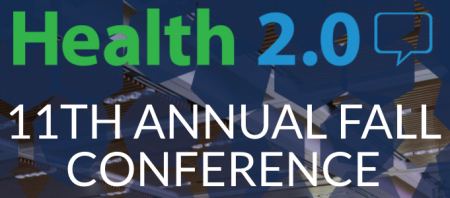
The future of effective and efficient healthcare will be underpinned by artful combinations of both digital technologies and “analog humans,” if the first day of the Health 2.0 Conference is a good predictor. Big thoughts about a decentralized future in healthcare kicked off Day 1 of the 11th annual Health 2.0 Conference in Santa Clara, CA. The co-founders of Health 2.0 (H20), Matthew Holt and Indu Subaiya, explained the five drivers of the tech-enabled health future. 1. The new interoperability, underpinned by FHIR standards and blockchain. “FHIR” stands for fast healthcare interoperability resources, which are informatics standards that enable data
Weaving Accenture’s Five Digital Health Technology Trends for 2017
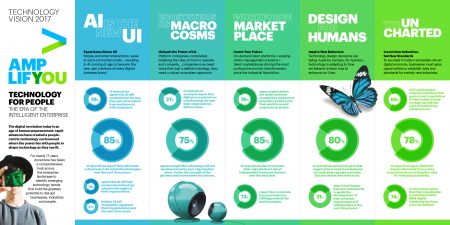
Technology should serve people, and Accenture has identified five major key trends that, together, could forge a person-centered, -friendly, -empowering healthcare system. This is Accenture’s Digital Health Technology Vision for 2017. “Should” and “could” are the important adverbs here, because if tech doesn’t deliver, driving efficiency and effectiveness, personalizing medical treatments, and inspiring people to become more health literate and health-engaging, then tech is just a Field of Dreams being built and available, with no people taking advantage of the potential benefits. The five new-new tech trends are: AI is the new UI, where healthcare experience is everything Ecosystem power
Patients and “Their” Medical Records: Crossing the Chasm
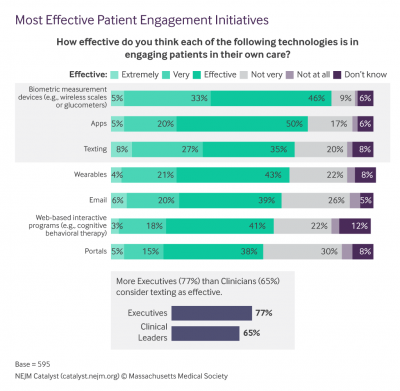
Most physician practices and hospitals in the U.S. have installed electronic health records (EHRs). But in a classic Field of Dreams scenario, we have made patients’ medical records digital, but people aren’t asking for them or accessing them en masse. “How do we make it easier for patients to request and manage their own data?” asks a report from the Office of the National Coordinator of Health IT (ONC), Improving the Health Records Request Process for Patients – Highlights from User Experience Research. The ONC has been responsible for implementing the HITECH Act’s provisions, ensuring that health care providers have met Meaningful
Artificial Intelligence, AI, Is Becoming the New Operating System in Health – Accenture
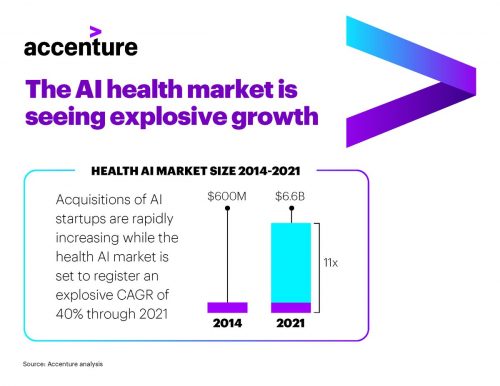
Artificial Intelligence, AI, can help drive the Triple Aim in healthcare, reducing cost, improving quality, and expanding access, according to Artificial Intelligence: Healthcare’s New Nervous System from Accenture. Acquisitions of AI developers in health will be fast-paced, growing at a compound annual growth rate of 40% – “explosive” in the word of Accenture – moving from $600 mm in 2014 to $6.6 billion in 2021. What these AI startups will do is to enable machines to sense, comprehend, act and learn, Accenture foresees, to augment administrative and clinical tasks which could free up healthcare labor (say, doctors, other clinicians, and accountants)
Digital Healthcare At the Inflection Point, Via Mary Meeker
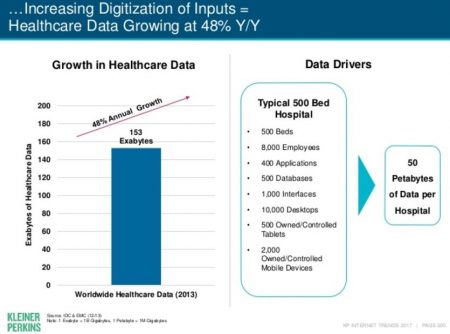
Healthcare is at a digital inflection point, asserts Internet Trends 2017 – Code Conference, by the iconic Mary Meeker of Kleiner Perkins. Published May 31, 2017, few tech-focused reports have the gravitas or generate the readership that this report does. I’m one of Meeker’s perennial readers, covering this report through my health/care lens here on Health Populi for several years (links to previous posts below). Of the report’s 355 pages, 22 are devoted to healthcare (pages 288-319), a section curated by Noah Kaufman of KP. This section of the report assembles data from a range of publicly available sources,
A New Health Risk: Hacked Personal Medical Devices
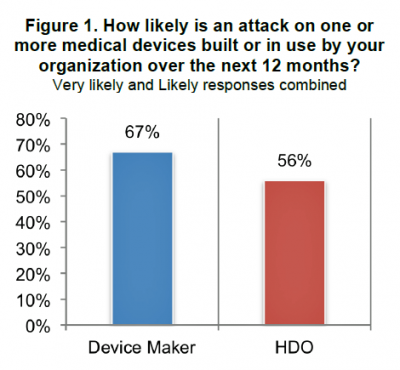
We have entered an era of insecurity in healthcare in America. While major attention is being paid to healthcare insurance and service insecurity, food insecurity and financial insecurity, there’s another one to add to this list: medical device security. As more medical devices have moved into the digital internet-connected mode, the risk for malware, ransomware, and overall hack-ability grows. This increasing and challenging risk is covered in the report, Medical Device Security: An Industry Under Attack and Unprepared to Defend from Ponemon Institute. Ponemon Institute has been tracking information security across industries, including healthcare, for several years. In this survey, sponsored
Expecting Alexa and Roomba for Health: Emerging AI and Robotics Trends for Healthcare via PwC
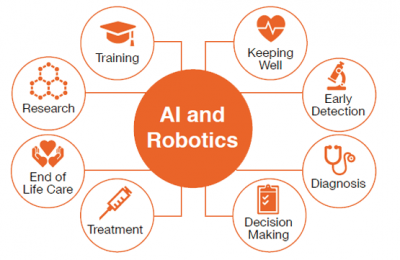
“What doctor?” asks the title of a PwC report on the emergence of artificial intelligence (AI) and robotics in healthcare. AI and robot technology are penetrating all aspects of the macroeconomy, and they’ve begun to re-shape the health economy, as well. Underneath PwC’s titular question are two lenses: the role of the AI/robot doctor vis-a-vis the role of the human doctor. PwC identifies eight areas that AI and robotics will impact in healthcare, shown in the first diagram: Decision making Diagnosis Early detection End of life care Keeping well Research Training, and Treatment. For keeping well, AI and robotics can
Cybersecurity and Healthcare Consumers: My Conversation with Dr. Kaveh Safavi, Accenture

Patients are morphing into consumers, but with eyes wide open: they know about data breaches, and they increasingly demand healthcare services delivered on their own terms. I met with Accenture’s Dr. Kaveh Safavi, Frances Dare, and Jenn Francis at HIMSS17 to discuss their latest research into these two topics. In this post, I’ll cover the growing challenge of cybersecurity and what Accenture learned about consumer data breaches. Tomorrow I’ll discuss Accenture’s latest findings on the expectations of the evolving health/care consumer. [Spoiler alert: personal health information data security is one of those expectations]. At HIMSS17, the issue of cybersecurity is
Healthcare and the Autonomous Car: Setting the Stage for HIMSS17

The autonomous car is a metaphor for healthcare: that’s how my first interview kicking off the HIMSS marathon began. The annual 2017 HIMSS conference isn’t your father’s or mother’s HIMSS of ten years ago, or even the HIMSS of 2010 — the year that financial incentives for EHR adoption began to stream from the HITECH Act of 2009, motivating thousands of healthcare providers to acquire and meaningfully use digital health records systems. Then, the HIMSS conference floor was abuzz with EHR frenzy. This week, over 43,000 people working at the intersection of healthcare and technology have converged in Orlando, Florida, for
Digital Technology Is A Bridge To Healthcare Consumers: A HIMSS Preface

“Digital technology can provide a bridge to the healthcare system via sensors, tools, and trackers for people who are living their lives each day,” I explained to the social media team at Philips, which is morphing as an organization to being all digital health, all-the-time. (Here’s what I learned about Philips and digital health in January 2017 after meeting with Jeroen Tas at the CES in Vegas). Here’s the larger discussion, shared with several of my fellow members of the HIMSS Social Media Ambassador family. I’ll be meeting with Philips’ leadership at HIMSS, the annual health IT conference that
How Amazon Has Primed Healthcare Consumers

We are all Amazon Prime primed as consumers now. So it should not surprise healthcare providers, plans and suppliers that consumers expect just-in-time convenience for their healthcare, Accenture has found. Mind the gap: 8 in 10 U.S. patients would welcome some aspect of virtual healthcare, but only 1 in 5 providers is meeting that need. The consumer demand for virtual care is palpable for: Tracking biometrics, among 77% of consumers (say, for measuring blood pressure or blood glucose for people managing diabetes) Following up appointments, for 76% of people after seeing a doctor or being discharged from hospital Receiving reminders
My $100 Flu Shot: How Much Paper Waste Costs U.S. Healthcare

An abbreviated version of this post appeared in the Huffington Post on 9 February 2017. This version includes the Health Populi Hot Points after the original essay, discussing the consumer’s context of retail experience in healthcare and implications for the industry under Secretary of Health and Human Services Tom Price — a proponent of consumer-directed healthcare and, especially, health savings accounts. We’ll be brainstorming the implications of the 2016 CAQH Index during a Tweetchat on Thursday, February 16, at 2 pm ET, using the hashtag #CAQHchat. America ranks dead-last in healthcare efficiency compared with our peer countries, the Commonwealth Fund
Doctors See Benefits in Patient Engagement Via Health IT
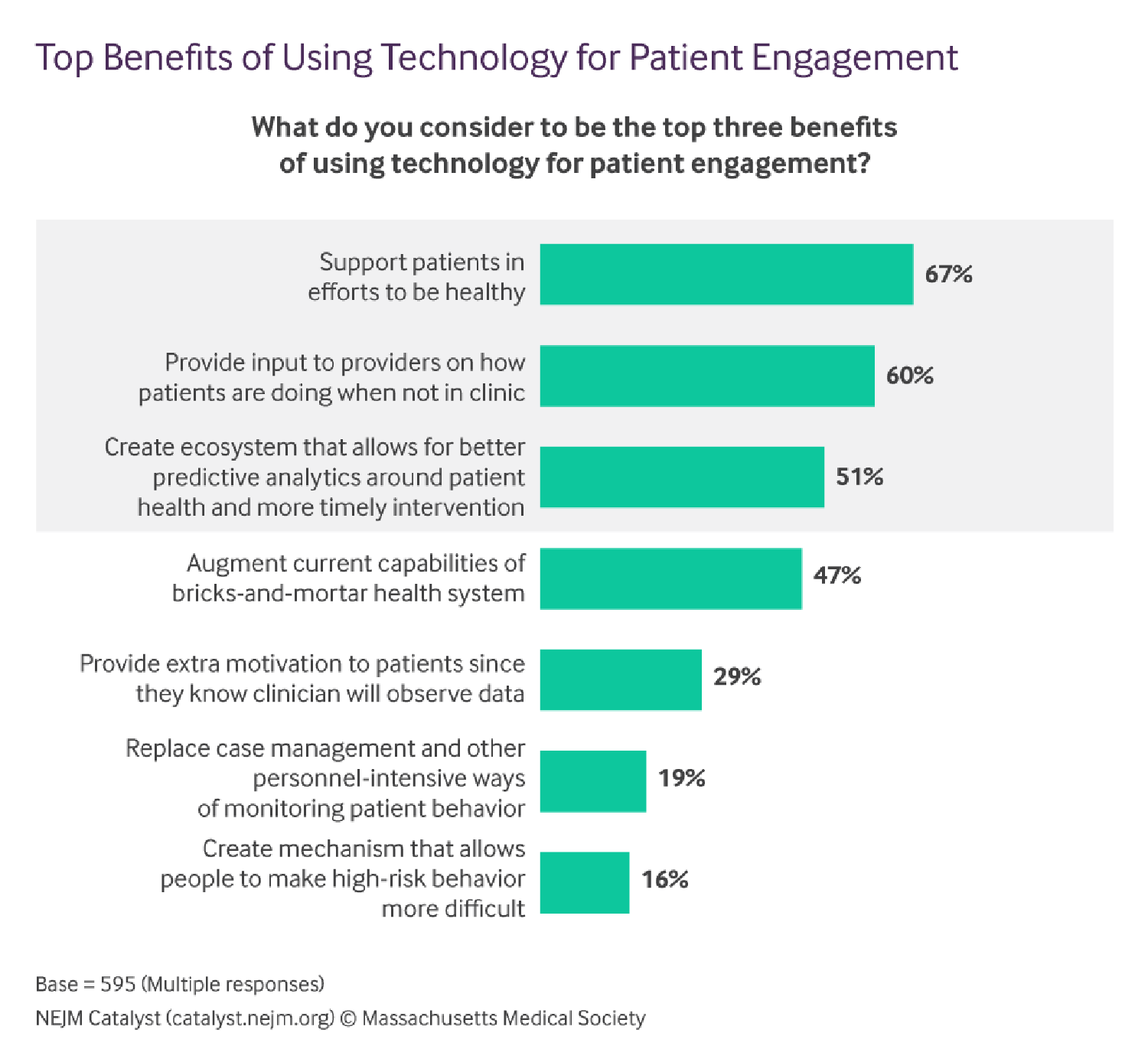
A special report on patient engagement and digital technology was published this month in the New England Journal of Medicine (NEJM). Based on a survey of doctors and healthcare executives, the research found that clinicians and managers welcome the opportunity to use digital tech — when it makes financial sense. That conclusion inspired the title of the article, Patient Engagement Survey: Technology Tools Gain Support – But Cost Is a Hurdle. NEJM polled 595 members of the NEJM Catalyst Insights Council, which included healthcare executives and clinicians who deliver healthcare. Here is NEJM’s scenario on patient-engaging health IT, a Holy Grail of sorts:
The Health Disparity of Information Access
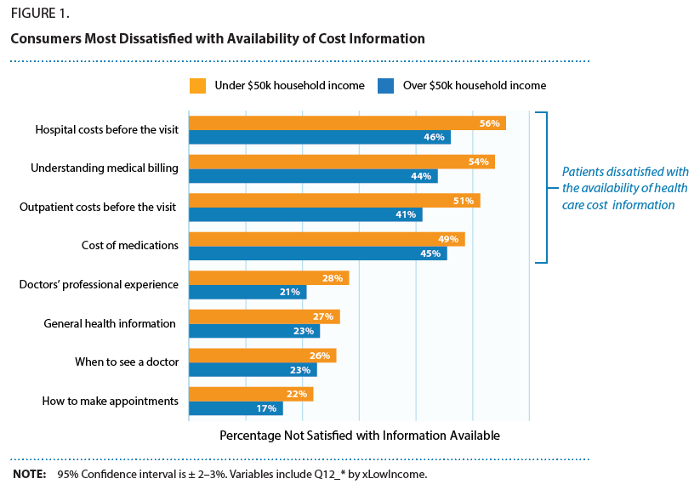
Among many health disparities which mar healthcare quality in the United States, there’s another one to add to the list: health and healthcare information access. Access to health care is underpinned in large part on a health consumer’s access to information about available health care services, their location, price, and if the patient is very fortunate to glean, quality. As people take on more responsibility for managing their health care utilization and financing in America, their access to information that is easy-to-find, clear, comprehensive and current is critical to personal and public health outcomes. But consumers are dissatisfied with the
Health/Care Data Ecosystems E-merge at CES 2017
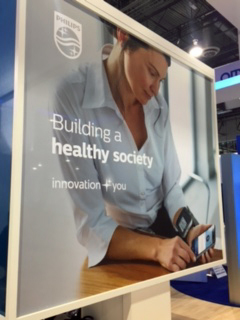
Digital health innovations were fast-proliferating at CES 2017. The bad news is there are so many of them, it’s dizzying and fragmented. The good news is that there are emerging health data ecosystems that will streamline consumers’ user experience so that people can derive knowledge, actionable advice and value out of using these tools. Walking miles of aisles in the Sands Convention Center in the first week of January 2017 can be a dizzying prospect, with hype and best-faces-forward in every single exhibitor at the show. In the health segment at CES, there’s a long list of digital tools to
Evidence That Mainstream Consumers Growing Digital Health Muscles
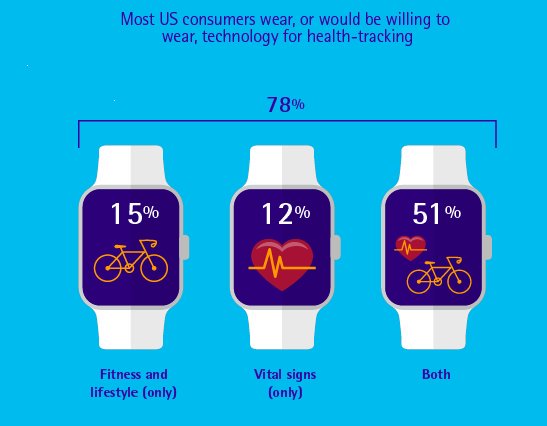
About 1 in 2 patients in the US are accessing their electronic health records in early 2016, according to Accenture’s 2016 Consumer Survey on Patient Engagement, Patients Want a Heavy Dose of Digital. This post is based on a presentation I attended by Accenture’s Dr. Kipp Webb yesterday. Accenture conducted survey research with consumers in seven countries for this study. The data and insights shared in this post are based only on the survey results from 2,225 US patients. The proportion of US health consumers accessing their health records grew from 27% in 2014 to 45% in 2016 — an increase of
How Value and Consumerism Will Reshape the $5 Trillion Healthcare Market
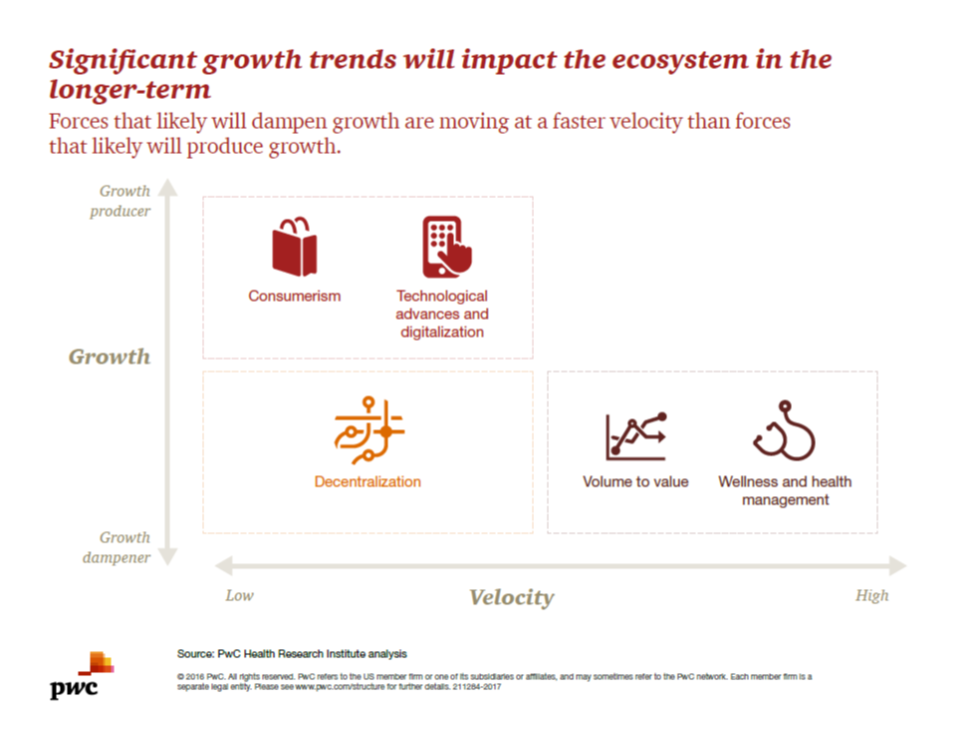
Existing healthcare industry players – the stakeholders of hospitals, physicians, pharma/life sciences, medical device manufacturers, and health plans – are operating in a whirlwind of change. While there are many uncertainties in this period of transition, there’s one operational certainty: learn to do more with less payment. That’s due to the growing pursuit of payors paying for value, not on the basis of volume or what’s “done” to a patient in care delivery. At the same time, another force re-shaping healthcare is interest and focus on wellness and health management. Combined with the growing health economic value proposition, wellness and
Doctors Are Growing to Like Digital Health Tools, Says the AMA
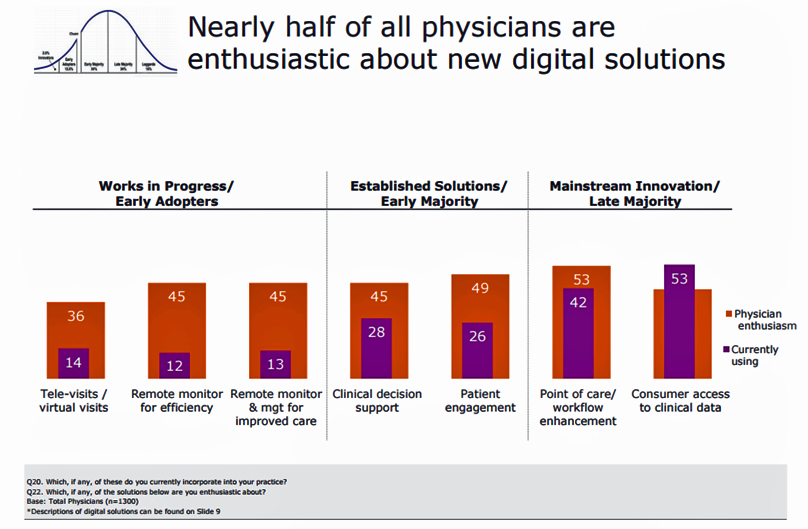
Notwithstanding the head of the AMA recently referring to digital health technologies as “snake oil,” it appears that one-half of physicians is keen on digital health. And scale, not age, matters when it comes to doctors using digital health tools. The American Medical Association (AMA) surveyed physicians on their use of digital health tools, finding that primary care physicians (PCPs) and doctors working in larger and more complex practices tend to be more digital. In Physicians’ motivations and requirements for adopting digital clinical tools, the AMA’s digital health study, “Physicians are optimistic about digital health innovation and its game-changing potential
Most Hospitals Offer Patients Electronic Access to Medical Records
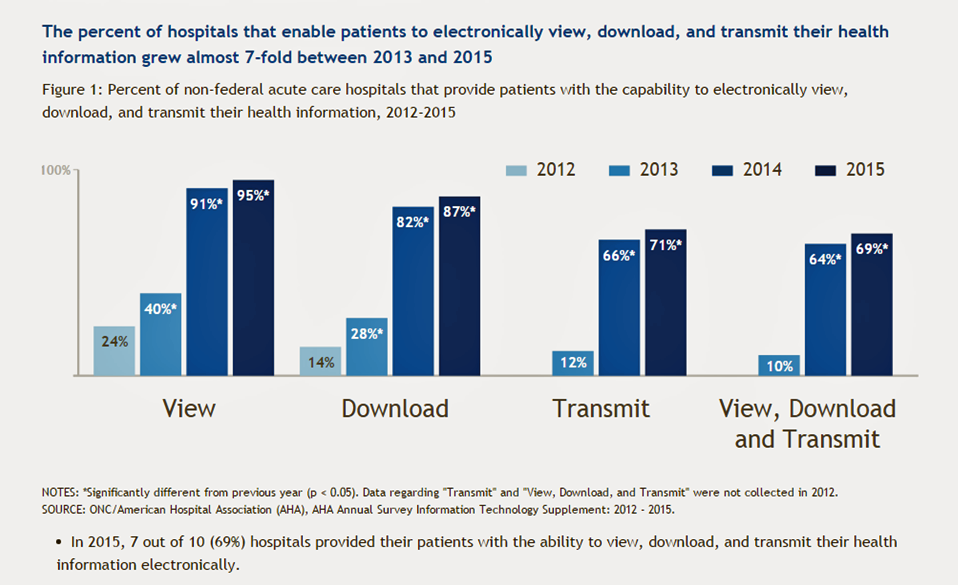
The number of hospitals offering patients electronic access to their health information grew seven times between 2013 and 2015. Electronic health records access has gone mainstream in America, according to the latest findings by The Office of the National Coordinator for Health Information Technology (ONC-HIT). The data are detailed in Electronic Capabilities for Patient Engagement among U.S. Non-Federal Acute Care Hospitals: 2012-2015, an ONC Data Brief. Two in three U.S. patients can now view, download, and transmit their personal health information, shown in the bar chart. This hockey-stick growth, from 10% in 2013 to 69% in 2015, results from the
Consumers Seek Quality and Privacy In Tech-Enabled Healthcare

Consumers are open to technology-enabled healthcare, but look to providers to ensure quality and privacy of patients’ personal health information, according to Will Patients and Caregivers Embrace Tech-Enabled Healthcare?, based on the Deloitte 2016 Survey of US Health Care Consumers. Seven in 10 consumers would use at least one of the technologies Deloitte served up in its study, with telemedicine at the top of the list: 49% of people favor telemedicine for post-surgical care, 48% for chronic disease management, 36% for care while traveling, and 32% for minor health issues. While Millennials are generally keener across-the-board for tech-enabled health care,
Most Americans Say Health IT’s Important – But Not Well-Used
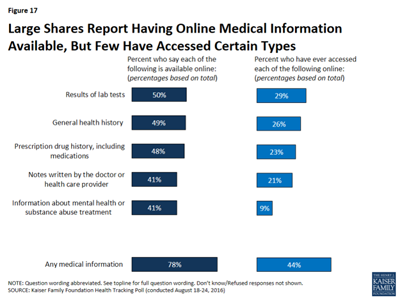
Most Americans say accessing their lab tests, health history, prescription drug lists, and doctors’ notes is important. But patients in the U.S. do not universally have access to their electronic health information, and nor do all those who can access their personal health information do so, according to the Kaiser Health Tracking Poll: August 2016 from the Kaiser Family Foundation (KFF). In yesterday’s Health Populi blog, I focused on the Poll’s political findings — that Hillary Clinton is perceived by more American voters than Donald Trump to be trusted on health care issues. In today’s post, I’ll cover the poll’s findings on
More Americans See Hillary Clinton As the 2016 Presidential Health Care Candidate
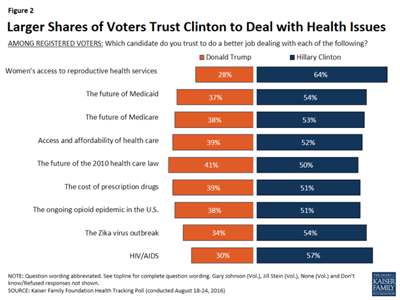
When it comes to health care, more American voters trust Hillary Clinton to deal with health issues than Donald Trump, according to the Kaiser Health Tracking Poll: August 2016 from the Kaiser Family Foundation (KFF). The poll covered the Presidential election, the Zika virus, and consumers’ views on the value of and access to personal health information via electronic health records. Today’s Health Populi post will cover the political dimensions of the August 2016 KFF poll; in tomorrow’s post, I will address the health information issues. First, let’s address the political lens of the poll. More voters trust Hillary Clinton to do
Retail Clinics Continue to Shape Local Healthcare Markets
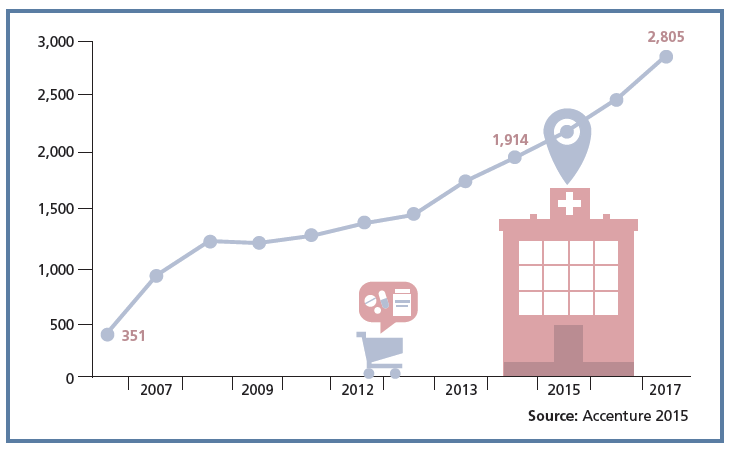
Retail clinics are a growing source of primary care for more U.S. health consumers, discussed in a review of retail clinics published by Drug Store News in July 2016. There will be more than 2,800 retail clinics by 2018, according to Accenture’s tea leaves. Two key drivers will bolster retail clinics’ relevance and quality in local health delivery systems: Retail clinics’ ability to forge relationships with legacy health care providers (physicians, hospitals); and, Clinics’ adoption and effective use of information technology that enables data sharing (e.g., to the healthcare provider’s electronic health records system) and data liquidity (that is, securely moving
Most Wired Hospitals Spending on Cybersecurity, Telehealth and Population Health
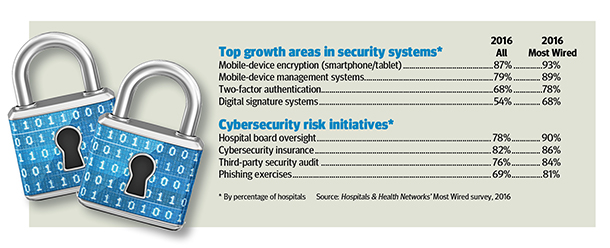
Investing information technology dollars in telehealth and mobile platforms, patient engagement, and cybersecurity are major focuses for leading IT-savvy hospitals in America, according to the 2016 Most Wired survey of healthcare organizations, released in July 2016 sponsored by Hospitals and Health Networks and Health Forum, a division of the American Hospitals Association. This survey, in its 18th year, has become an important benchmark measuring the adoption of information technology tools and services among American hospitals and health systems. The complete list of Most Wired hospitals for 2016 can be found here. The most popular telehealth services offered by the Most Wired hospitals are
The Promise of the Platform Economy for Health

There’s a lot of talk about the growing platform economy. If well-designed platforms get adopted in healthcare, they may help our ailing healthcare systems get better. The quality, safety, and convenience of healthcare in America suffer from a lack of patients’ personal health data being essentially locked in data siloes. The diagnosis is lack of data “liquidity:” the ability for our health information generated in various touch points in the healthcare system and in our personal lives each day to move outside of the locations where the bits and bytes were first created: to our clinicians, researchers, health providers, and to
The Primacy of People as Health/Care Goes Digital: Accenture
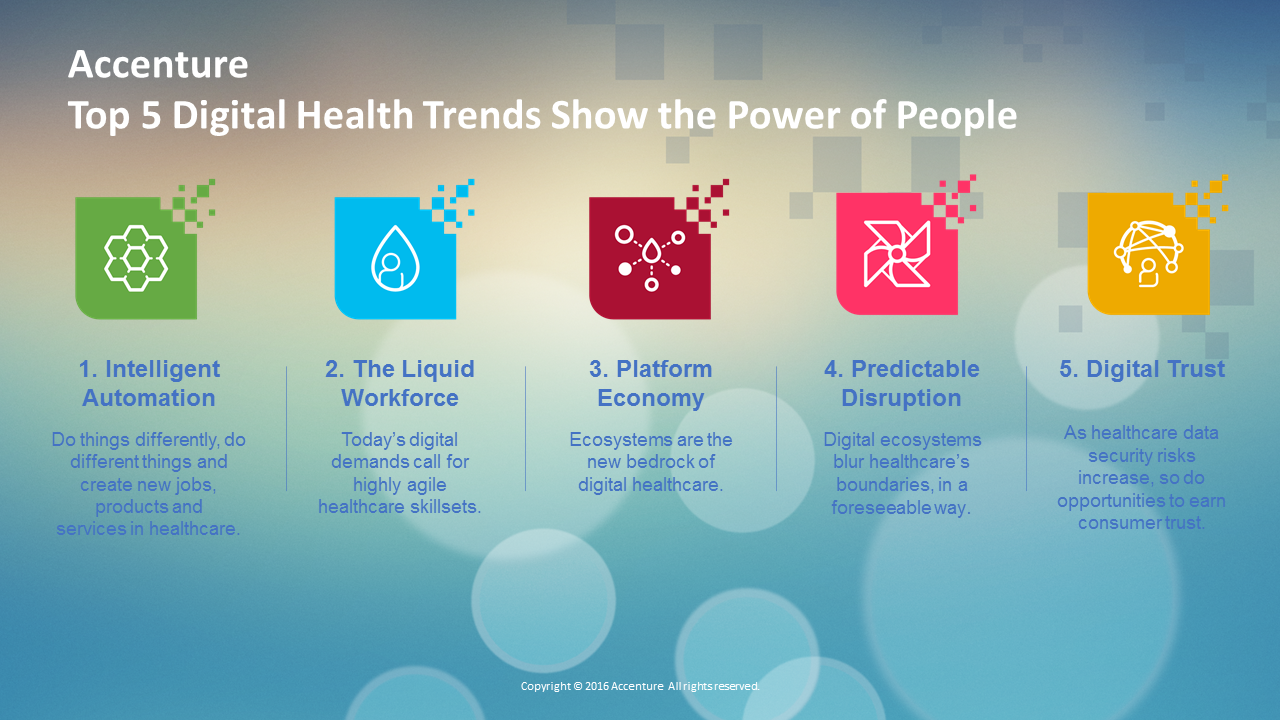
Digital platforms and tools are fast-advancing in all industries, and especially in health and health care. But it’s people-first, and digital PLUS analog, based on Accenture’s latest forecast of five macro technology trends. The five forces are: Intelligent automation – 70% of health executives expect to invest more in artificial intelligence; Liquid workforce – 42% of health/care workers are expected to be contractors or free agents within organizations within 3 years’ Platform economy – 10x growth is expected in application programming interfaces (APIs) in the next five years, which will enable data to liquidly move across healthcare platforms Predictable disruption
Are We Health Engaged Yet? Frost & Sullivan Responds “Meh”
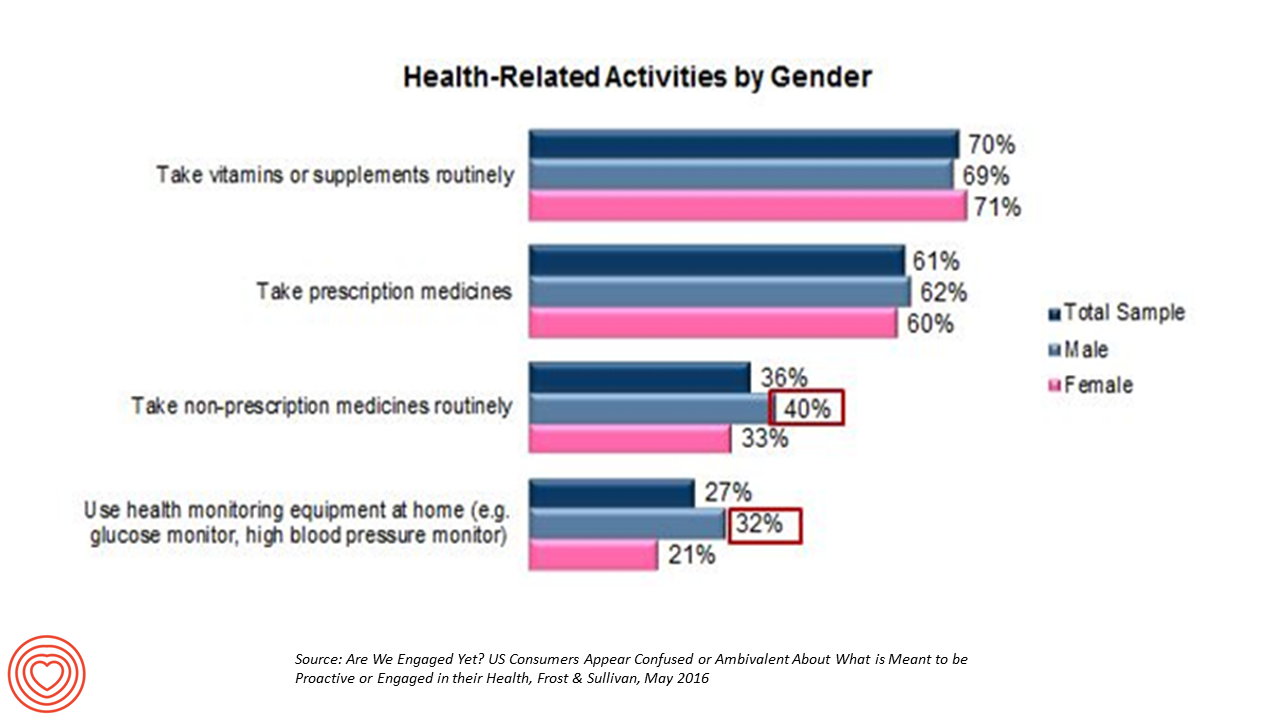
The top health-related activities among U.S. adults include routinely taking vitamins and supplements, and prescription medicines, according to Frost & Sullivan’s report, Are We Engaged Yet? Their response to the titular question lies in in the subtitle: “US consumers appear confused or ambivalent about what it means to be proactive or engaged in their health.” 1 in 2 U.S. adults says they’re “somewhat engaged” in their healthcare, according to Reenita Das’s write-up on the study in Forbes magazine. She notes that: Consumers with higher incomes have more confidence in their access to health care services and quality of care Budget-constrained consumer
Digital Health Update from Silicon Valley Bank
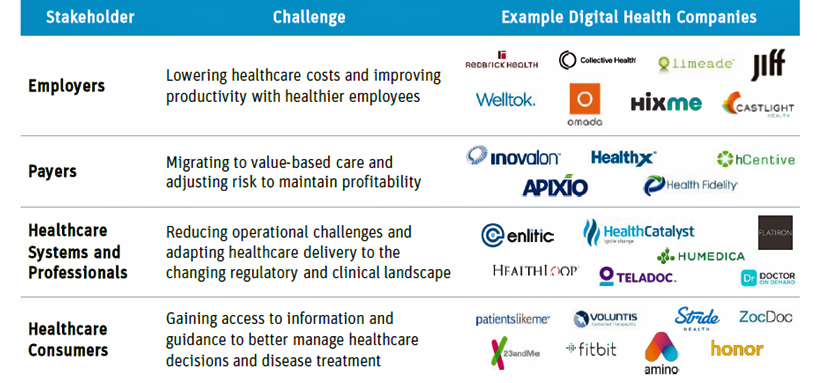
Who better than a financial services institution based in Silicon Valley to assess the state of digital health? Few organizations are better situated, geographically and sector-wise, than SVB Analytics, a division of Silicon Valley Bank based in, yes, Silicon Valley (Santa Clara, to pinpoint). The group’s report, Digital Health: Opportunities for Advancing Healthcare, provides an up-to-date landscape on the convergence of healthcare and technology. SVB Analytics defines digital health as “solutions that use digital technology to improve patients’ health outcomes and/or reduce the cost of healthcare.” The report provides context for the digital health market in terms of health care costs,
The Hospital of the Future Won’t Be a Hospital At All
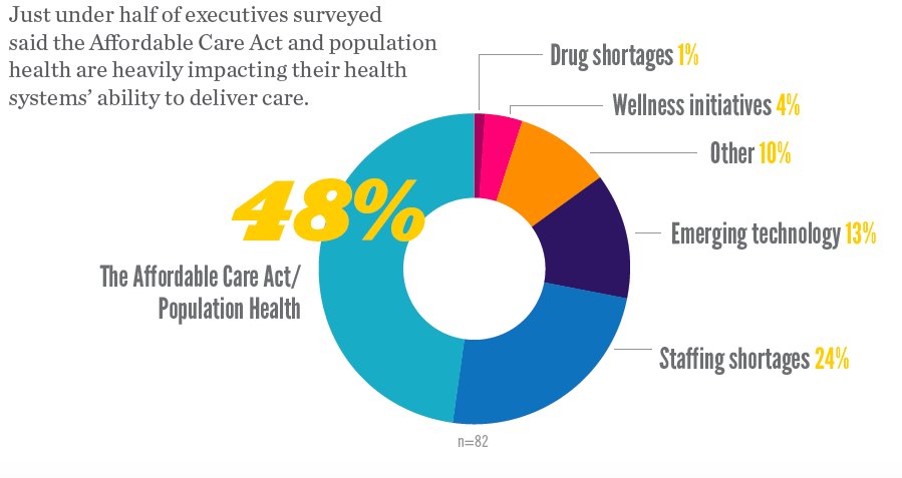
In the future, a hospital won’t be a hospital at all, according to 9 in 10 hospital executives who occupy the c-suite polled in Premier’s Spring 2016 Economic Outlook. Among factors impacting their ability to deliver health care, population health and the ACA were the top concerns among one-half of hospital executives. 1 in 4 hospital CxOs think that staffing shortages have the biggest impact on care delivery, and 13% see emerging tech heavily impacting care delivery. Technology is the top area of capital investment planned over the next 12 months, noted by 84% of hospital execs in the survey.
Paper and Fax, Not EHRs or Portals, Are Popular for Health Data Sharing
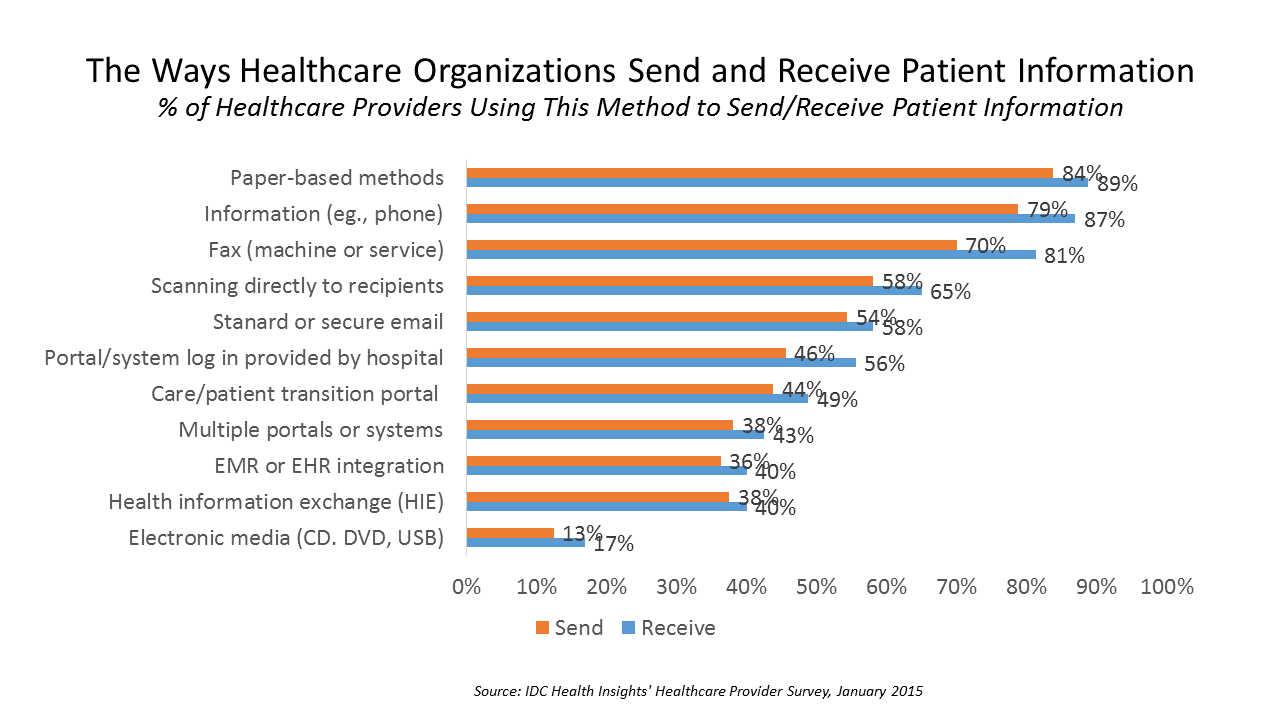
Faxing in health care ranks higher in patient data information sharing than using secure email, online portals, health information exchange (HIE), or leveraging electronic health records. Welcome to the American healthcare system in 2016, as described in a market spotlight published by IDC, The Rocky Road to Information Sharing in the Health System. IDC’s survey research among healthcare providers forecasts the “rocky road” to information sharing. That rocky road is built for medical errors, duplication of services, greater healthcare costs, and continued health il-literacy for many patients. “The holy grail of interoperability — lower-cost, better-quality care with an improved experience for
The Growth of Digital Patient Engagement
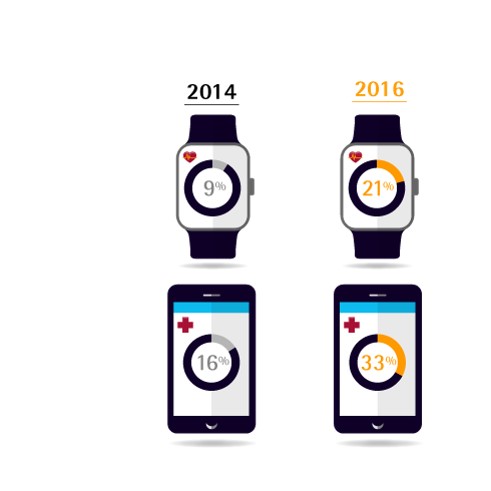
9 in 10 people in the U.S. use some form of digital technology or electronic tools for health management, Accenture found in the company’s 2016 Consumer Survey on Patient Engagement. Younger people (18-34) tend to favor wearable technology, apps and social media for health. More older people (age 65-74) mine electronic health records (EHRs) for personal health data and more likely use tech for remote consultations with care providers. Overall, the percent of U.S. consumers accessing their EHR data grew by over 50% between 2014 and 2016, from 27% to 45% of people doing so, with older people indexing higher
Yin and Yang: Doctors and Patients’ Bipolar Views on EHR Access
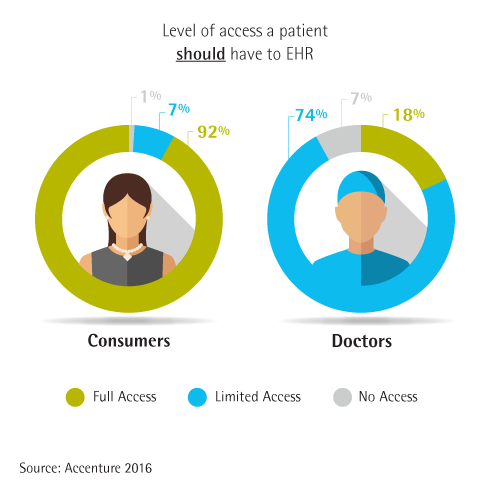
Patients are from Mars and Doctors from Venus when it comes to their views on whether consumers should have full access to their electronic health records (EHRs), according to a survey from Accenture released this week at the 2016 meeting of the HIMSS conference in Las Vegas. The vast majority of consumers are keen to access their full EHR, compared to a majority of doctors who advocate for limited access, as the circle diagram dramatically illustrates. The “old days” of patient information asymmetry — with a paper-based folder that got locked up in a health records cabinet — are gone.





 I'm in amazing company here with other #digitalhealth innovators, thinkers and doers. Thank you to Cristian Cortez Fernandez and Zallud for this recognition; I'm grateful.
I'm in amazing company here with other #digitalhealth innovators, thinkers and doers. Thank you to Cristian Cortez Fernandez and Zallud for this recognition; I'm grateful. Jane was named as a member of the AHIP 2024 Advisory Board, joining some valued colleagues to prepare for the challenges and opportunities facing health plans, systems, and other industry stakeholders.
Jane was named as a member of the AHIP 2024 Advisory Board, joining some valued colleagues to prepare for the challenges and opportunities facing health plans, systems, and other industry stakeholders.  Join Jane at AHIP's annual meeting in Las Vegas: I'll be speaking, moderating a panel, and providing thought leadership on health consumers and bolstering equity, empowerment, and self-care.
Join Jane at AHIP's annual meeting in Las Vegas: I'll be speaking, moderating a panel, and providing thought leadership on health consumers and bolstering equity, empowerment, and self-care.